
On your mobile device? Tap on image. Open to second window. “Stretch” across the featured image on your device screen to magnify for larger print view.
On your PC? Click on image 2x for largest view.
![]()
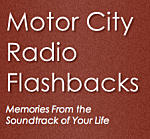 From the MCRFB NEWS archive: 1963
From the MCRFB NEWS archive: 1963
Juke Box Play Ceases As Nation Mourns
NEW YORK — Play on the nation’s 450,000 juke boxes was back to normal Friday, November 29, but for a 72-hour period last week few Americans had the stomach to listen to the mechanical music makers.
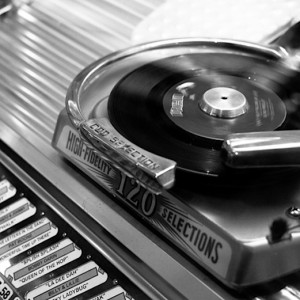 Automatic phonograph and game collections last weekend and Monday, November 25 were scanty, as millions of Americans stayed by their radios and television sets to watch the news developments and to view the funeral of President John Fitzgerald Kennedy.
Automatic phonograph and game collections last weekend and Monday, November 25 were scanty, as millions of Americans stayed by their radios and television sets to watch the news developments and to view the funeral of President John Fitzgerald Kennedy.
Even when surface normality was restored Tuesday, November 26, the gaiety commonly associated with taverns and restaurants were muted. And when patrons put their coins in the juke box, they did so in an almost mechanical manner.
Manhattan itself was almost a ghost town through the weekend and on Monday, November 25. Normally, Friday and Saturday nights are the big money makers for Gotham tavern owners. And these are the evenings that get that the heavy jukebox and game play. But few patrons were in the mood to play the juke box or coin-operated games. Most of them stayed home and watched the ceremonies on TV.
In Chicago, the coin machine business ground to a halt immediately following the tragic and bizarre series of events connected with the assassination of the President.
Juke boxes and games were shut off as the city’s attention turned elsewhere — first to the tragic scenes in Dallas, then to the mournful culmination of those scenes coming out of Washington, Monday, November 25.
Chicago Clubs Closed
Throughout the Windy City night clubs were closed, neon signs were dimmed and while some taverns were operating — at half capacity or less — talks inside were loosely centered on the Dallas tragedy and news instead, by its patrons, while glued to the establishment’s TV sets. Bands and combos were silent. Friday was the worst evening as people just couldn’t seem to comprehend what had happened.
By Tuesday did locations start to return to normal and even then the return was gradual and deliberate. Juke boxes which have been turned to the wall, were again plugged in, but there was no rush to play the coin-op record machines.
A check with the trade showed that over-all collections were off s much as 50 per cent or more. The comments of Earl Kies, head of Apex Music Company, are typical.
“We know for sure collections will be affected — we can judge by the service calls, they’ve been nil.” Kies said his service men were out on the streets but none had more than two calls a day.
“Many of the locations had out-of-order signs on the juke boxes,” said Kies. The Chicago juke box operator estimated that close to 80 per cent of his machines were down for the weekend and that his week’s collection would be off from 30 to 35 per cent.
Cleveland Juke Boxes Silent
In Cleveland, a crack of 21 guns echoed against the concrete and brick walls of the empty heart of this city this past Monday, November 25, the national day of mourning.
The city wept.
Virtually all businesses and industry closed down. Neon lights closed their eyes. Nightclubs and cafes, restaurants and movie houses closed their doors. A few remained open but there were few found inside.
A number of bars remained open but coin operated games and juke boxes remained silent. One bar which served a few patrons honored President Kennedy’s memory by displaying signs which over the darkened jukebox: “Will remain silent (today) in honor of our departed President — The Management.”
Most operators in this area reported the same experience. The few drink spots that remained open pulled the plugs from the music machines. Radio and television sets kept their patrons informed at every detail of the assassination and the burial of the former President.
The area operators generally figured the take for the day to be but a fraction of the normal volume. “But who can be concerned about it at a time like this,” said one prominent music man.
Joseph Abraham, president of Lake City Amusement, one of the oldest operators in terms of years in the business, reflected everyone’s attitude concerning the death of President Kennedy. “We’re all very shocked . . . we will be for a long time. It seems impossible that would happen in our country. Everything closed down. The bars, restaurants, a lot of plants and offices.
“Sure we lost some income . . . . but who cares at a time like this? All the boys feel the same way. Who could think of dollars and cents at this hour?”
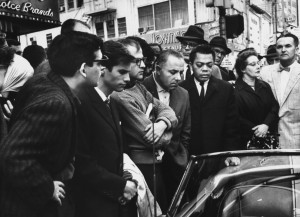
Charles Comella of Cadillac Music Company added: “We’ve actually been out of business since Friday, the day President Kennedy was assassinated. And believe me we’d stay out of business for two more Fridays if we thought it would bring him back!
“One of our locations that stayed open the day of the burial reported that the men sitting at the bar broke down and cried. We all were crying inside. It helped us put our lives in proper perspective.”
Milwaukee Pulls Stop On Music
In the state of Wisconsin, the same effects were reported from Milwaukee. Juke boxes stopped spinning Friday afternoon when the stunning news of the assassination of President Kennedy flashed over radio and TV sets. For the rest of the weekend the city’s taverns remained somber and silent.
“There has never been anything to compare to this type of reaction. Everything halted completely when the news hit. The music stopped and hasn’t started up yet,” reported Harold Opitz, Wisconsin Novelty Company, on Tuesday morning, November 26. “There has been no gaiety around here for four full days. Some of our better stops here say they never experienced anything like it. A lot of our locations cater strictly to Negro clientele. We they are quiet, you can bet tavern business is quiet all over. Many of the pubs completely closed down until after the President’s burial.”
According to Sam Hastings, Hastings Distributing Company, president of the Milwaukee Phonograph Operators’ Association: “We haven’t had time to completely evaluate the drop off. But, we know our take fell at least 25-50 per cent below normal.
“Our best barometer is the number of service calls we receive over a given period. Saturday, we had one service call. Normally we expect several dozen service calls during the weekend. From what other operators tell me, they all experienced the same decline in business as we did. It was noticeable all over the metro Milwaukee area. Tavern business was hit hard, and so was the coin machine industry.” END
___
(Information and news source: Billboard; December 7, 1963)
![]()
 From the MCRFB news archive: 1967
From the MCRFB news archive: 1967
Meek Gave Top 40 Radio Its Identity
Dallas — Bill Meeks, Pams’ President, didn’t invent top 40 radio, but it’s quite likely that top 40 radio wouldn’t be where it is today if there hadn’t been a Bill Meeks. Meeks helped give top 40 radio its zing . . . its identification.
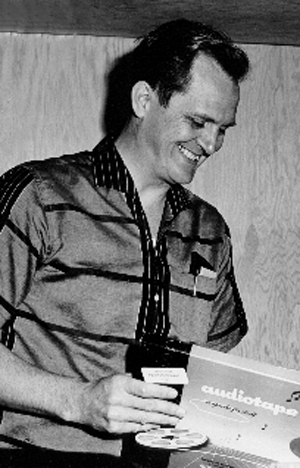
Meeks, a musician at home on saxophone, clarinet, of flute, got into the jingles-producing business while serving as air personality and salesman with KLIF here in 1947 . . . “the first jingles I ever heard of,” he said. He remembered one of those jingles as slashing on TV: “No worn-out old-time movies, no picture tubes to fail . . . ” It should be pointed out that Gordon McLendon, head of KLIF, was one of the pioneers in top 40 radio.
When Meeks began selling some of his jingles to other radio stations, “an odd thing began to happen. These stations began to climb in ratings.” In 1951, Meeks started Pams.
That first year of business, Pams did $300,000 worth of business. Meeks expects to close out 1967 with more than $1.5 million in business. Some of these will be new logos for all four of ABC’s new networks. Meeks was in town last week working on the project. In addition, he is branching out of the pop music field to also specialize in R&B and country music formats. Pams tailored the jingles used on WVON (R&B) in Chicago; the station climbed to No. 1 in a recent general Pulse audience survey and, as Meeks put it, “We were there when it happened.” Meeks is also going into the TV field on a larger basis.
Started In 1936
Meeks entered the radio business in 1936 with WRR in Dallas playing with a kid band called the Humdingers. The late Ben Riddle was a member of the band.They had a Sunday show on the station called “Primrose Parade” sponsored by an oil company. Then Meeks entered North Texas State. He continued to perform, substituting with bands like the Light Crust Dough Boys and the Cass County Kids. It was about this time he met McLendon, who encouraged him to become a KLIF salesman. KLIF had two salesmen, Meeks and a man named Bruce Collier. Meeks said he had Collier’s phone tapped “so I’d know who his clients were, I had to . . . he was really a slick salesman.”
While selling advertising, Meeks was also a deejay. At one point he had a CBS show starring one of his bands — the Circle Five Ranchhands — that originated out of Houston (the band would drive down from Dallas every Saturday). He also had a live show with a band doing a daily remote from a Dallas used car lot.
Employs 33
Today, Meeks operates a firm employing 33 (most of whom are professional musicians) and keeps two studios in Dallas busy. To illustrate the flexibility of his staff members, Rick Sklar, program director of WABC in New York, and Walter Schwartz, then general manager of WABC, once saw Pams’ Tommy Lloyd at work in the studio on trumpet. Later the same day, they saw and heard Lloyd playing in a band at the State Fair. That night, visiting the local LeVee nightclub, Schwartz and Sklar were surprised to see Lloyd , this time playing in a club band. He then saluted WABC right in the middle of “Sweet Lorraine,” by playing the WABC logo.
Meeks said that the turning point for Pams was in 1960 when he came up with a variable logo recording method to allow the various logos of stations to be recorded over the same big band instrumental, giving every station its own big band sound.
Besides having jingles packages in every major market in the United States, Pams products are in countries like Australia, Great Britain, Canada, Hawaii, Mexico, and South America. The firm just completed logos for the new BBC pop music programming service in England. END
___
(Information and news source: Billboard; December 2, 1967)
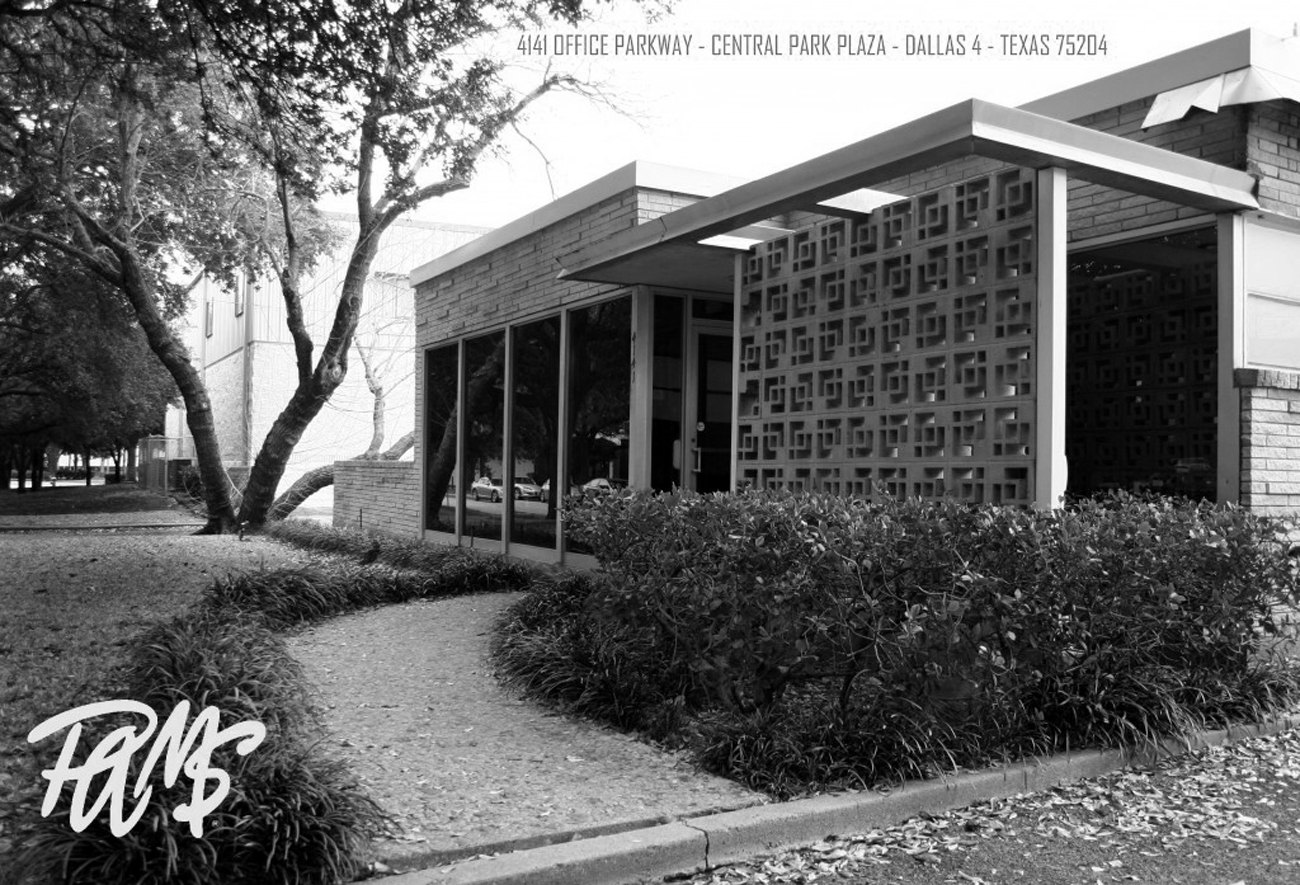
![]()
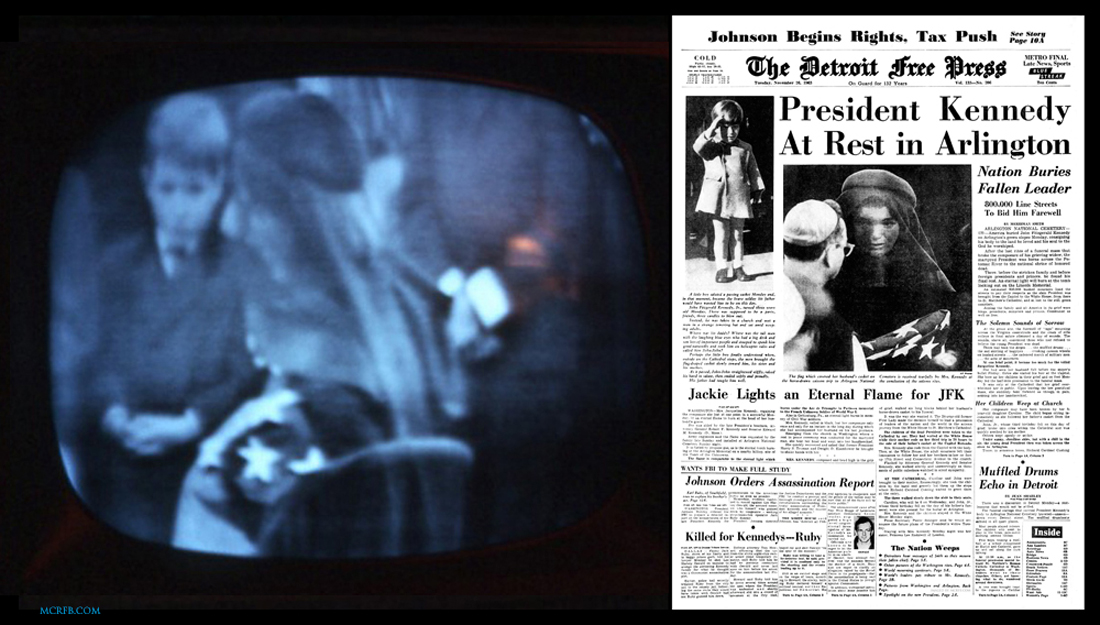
THE KENNEDY TAPES (Bob Pratt Collection) MONDAY, NOVEMBER 25, 1963 [A]
NBC Radio Network (11:16 A.M. – 1:15 P.M.)
_______________
In this segment you will hear NBC radio reports by the following correspondents:
Ron Nessen (Washington); Don Doke (White House); Ed Gulf (Mobile Unit); Dave Rush (St. Matthews Cathedral)
The complete coverage of the Low Pontifical Requiem Mass for President Kennedy at St. Matthews Cathedral, as broadcasted on WWJ, Detroit, on the NBC Radio Network. Highlights:
Hail to the Chief (JFK casket brought into Cathedral); Commencement of Mass; Entrance Hymn; Reading of the Gospel; Offertory; Consecration; The Lord’s Prayer; Celebrant’s Communion; Communion Missile; Communion Prayer; End of Mass; Words by Reverend Phillip M. Hannon (Auxiliary Catholic Bishop) Washington; Cardinal Richard Cushing; Cardinal and dignitaries exit Cathedral
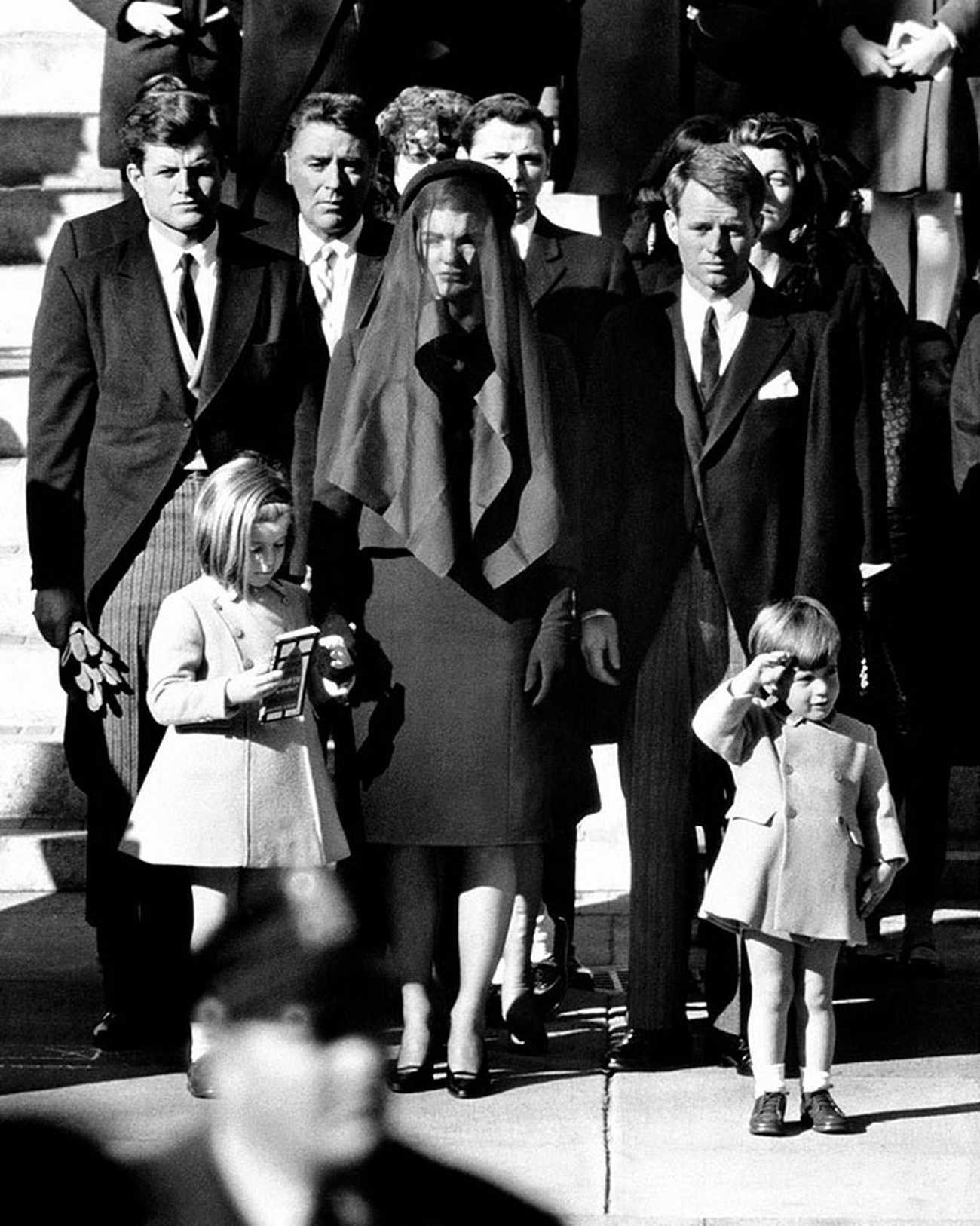
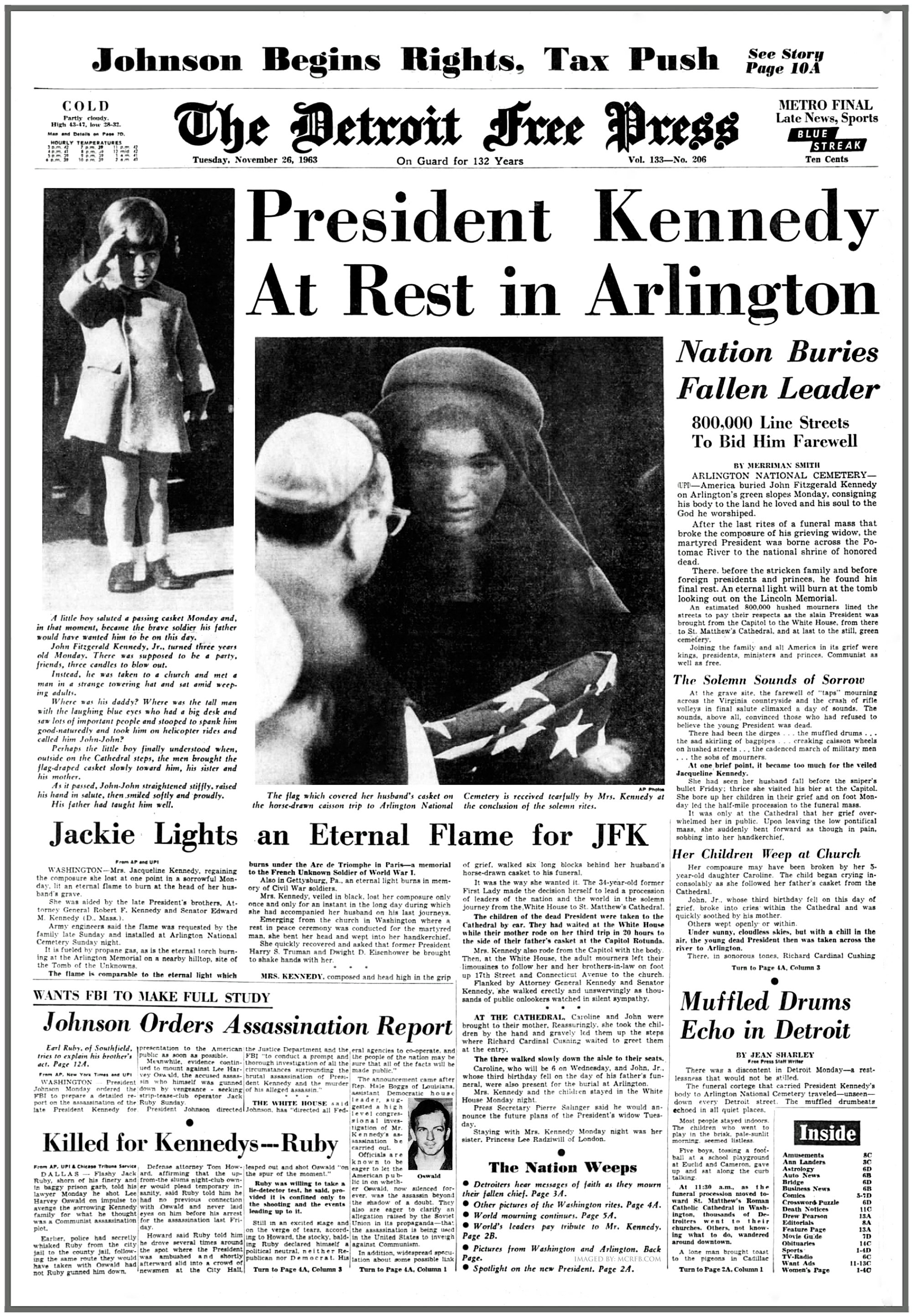
THE KENNEDY TAPES (Bob Pratt Collection) MONDAY, NOVEMBER 25, 1963 [B]
NBC Radio Network (1:16 P.M. – 3:43 P.M.)
_______________
In this segment you will hear the NBC reports of President John F. Kennedy’s State Funeral:
The complete and final coverage of President Kennedy’s Funeral. As broadcasted on WWJ, Detroit, on the NBC Radio Network. Highlights:
JFK’s casket, caisson leaves Cathedral; Ed Gulf, (Mobile Unit) reporting; JFK Funeral procession crossing Potomac; Procession continues; Procession enters Arlington; JFK casket carried to gravesite; Kennedy family approaches grave; National Anthem, Air Force Bag Pipes; The Fly-By; Blessing of the Grave (Richard Cardinal Cushing presides); Military Honor 21 Gun Salute; Oratory Prayers, Church Consecration; Military Honor Guard 3 Gun Salute, Playing Military Taps; Military Honor Guard folds Flag; Cushing officiates Prayers, recites Church Blessings of the Grave; Flag handed to Mrs. Kennedy, commence lighting of the Eternal Flame
” . . . John F. Kennedy, has been laid to rest.”
Classical music resumes play over the NBC Radio Network
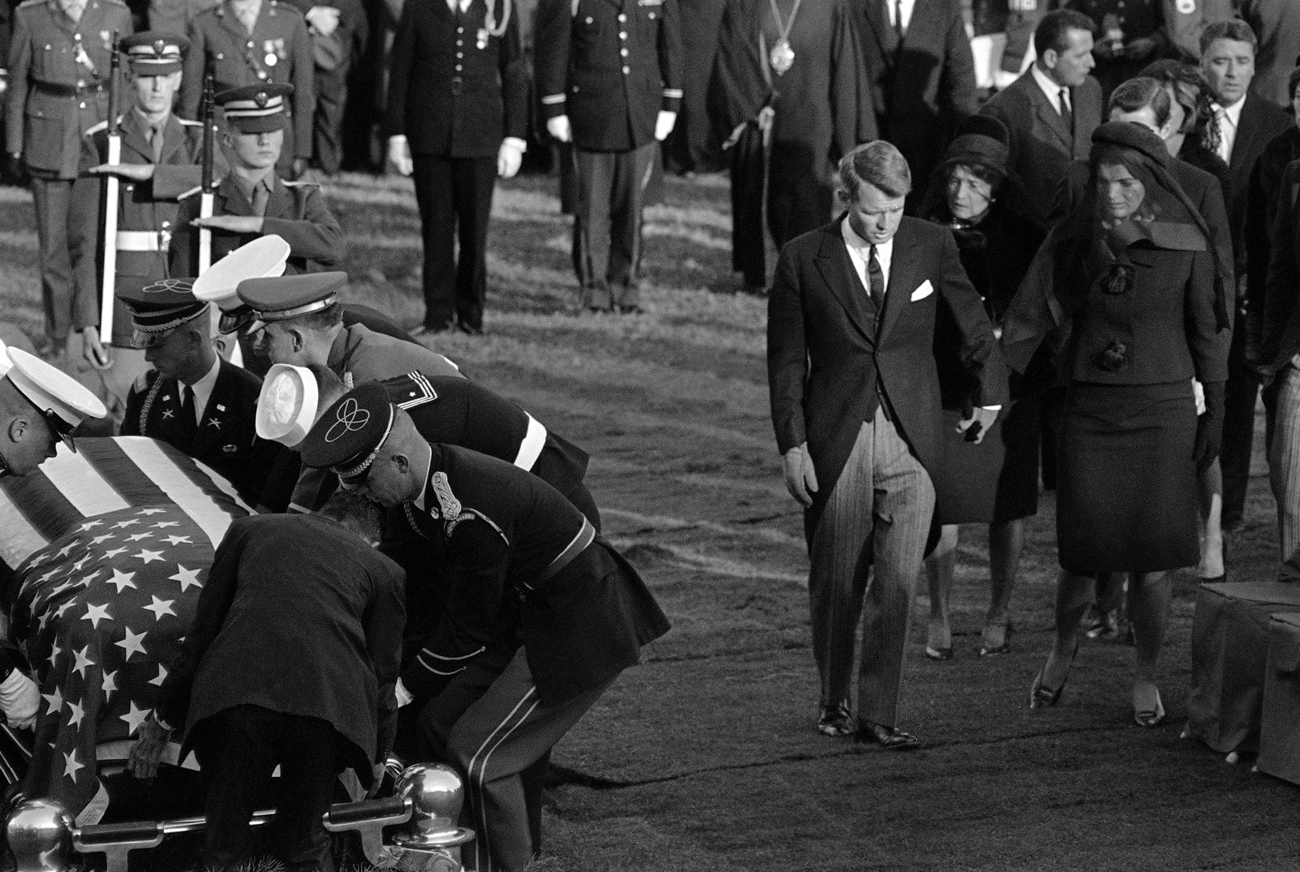
ABOUT THESE NOVEMBER 1963 RECORDINGS
_______________
A special THANK YOU to Bob Pratt, of Farmington Hills, MI., for contributing these historic recordings with Motor City Radio Flashbacks.
In November 1963, Bob Pratt recorded over 15 hours on reeled tapes covering the tragic four days, 55 years ago. The recordings began at 11:16 a.m. through 3:43 p.m., Monday afternoon, November 25, 1963.
Bob Pratt shares his recollections of President Kennedy’s assassination. His personal memories is featured on this website, here.
These 1963 Detroit radio broadcasts was never available to anyone — anywhere — until now. Motor City Radio Flashbacks features these historic recordings in their entirety — exclusively here — for the very first time.
_______________
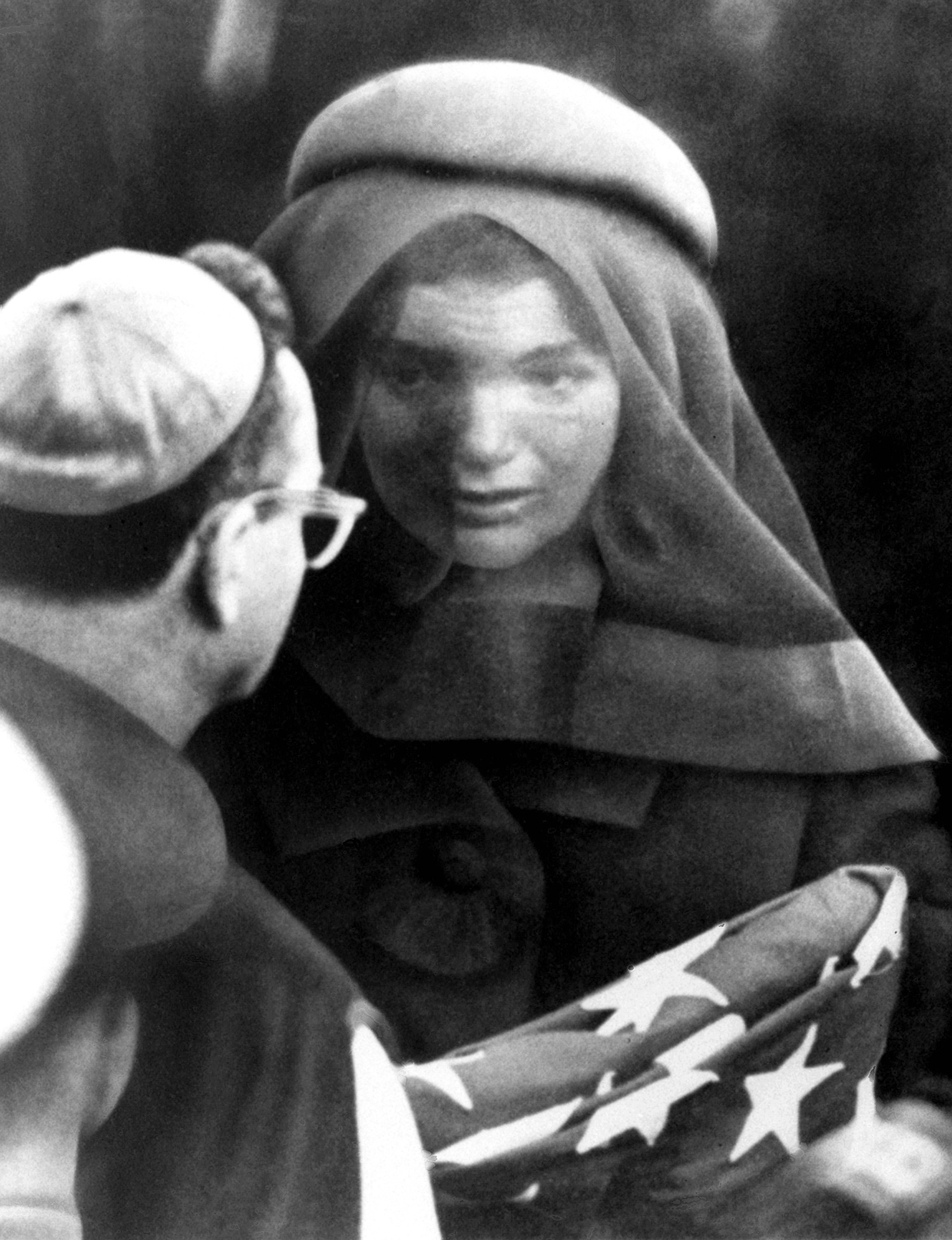
— ABOUT THESE IMAGES —
Above newspaper images courtesy from the freep.com newspaper archive. Copyright 2018. Newspapers.com.
The above featured images was ‘clipped,’ saved, and imaged from the credited source by Motor City Radio Flashbacks
If viewing on your mobile device, tap over newspaper images. Open to second window. “Stretch” images across your device screen to magnify detailed view.
All images posted in this featured presentation was created by Jim Feliciano. The ‘televised’ image was used, having been obtained from the personal collection of the author.
Photos featured: Associated Press
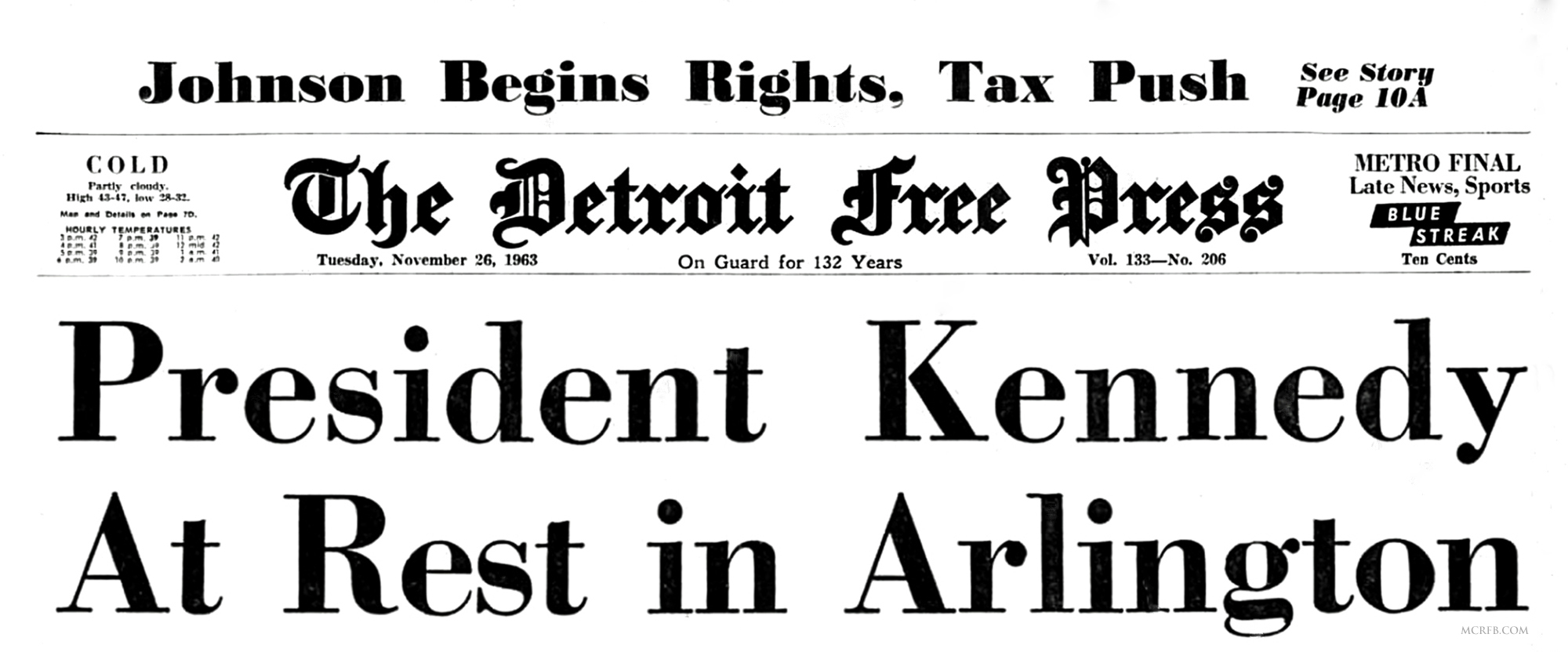
![]()
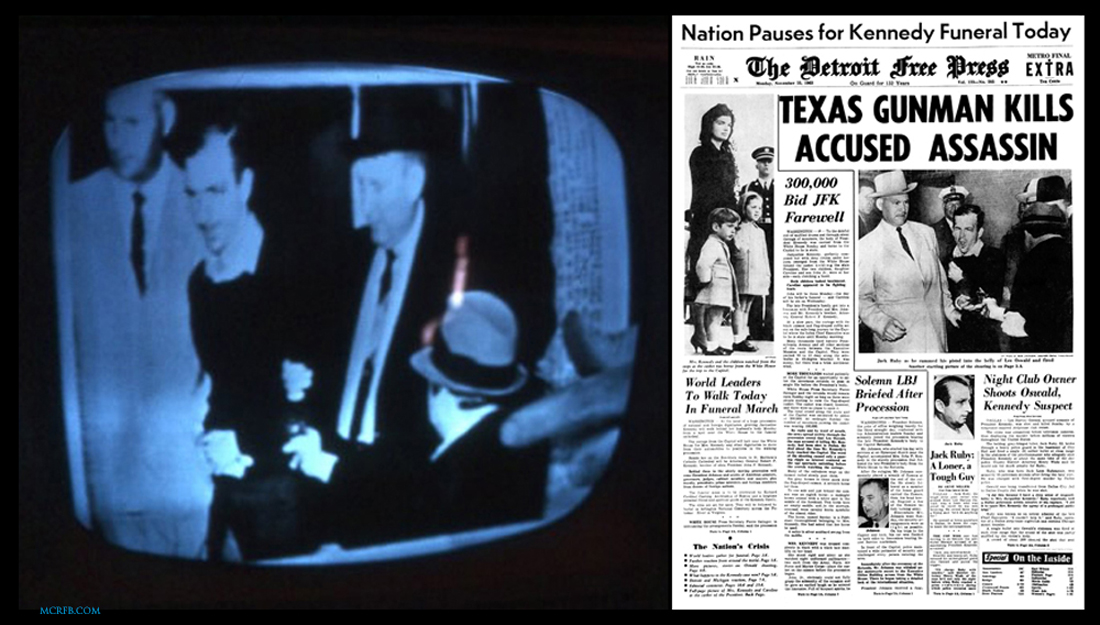
THE KENNEDY TAPES (Bob Pratt Collection) SUNDAY, NOVEMBER 24, 1963 [A]
NBC Radio Network (12:28 P.M. – 3:02 P.M.)
_______________
In this segment you will hear NBC radio reports by the following correspondents:
Tom Petitt (Dallas); Roger Ready (Dallas); Tom Perryman (Dallas); Robert McCormick (Washington); Herbert Kaplow (Washington); Don Doke (Washington); Jack Perkins (Washington); Richard Harkness (Washington); Bryson Rush (Washington)
Also, the NBC radio memorial tribute, ‘President John F. Kennedy: The Highest Price’
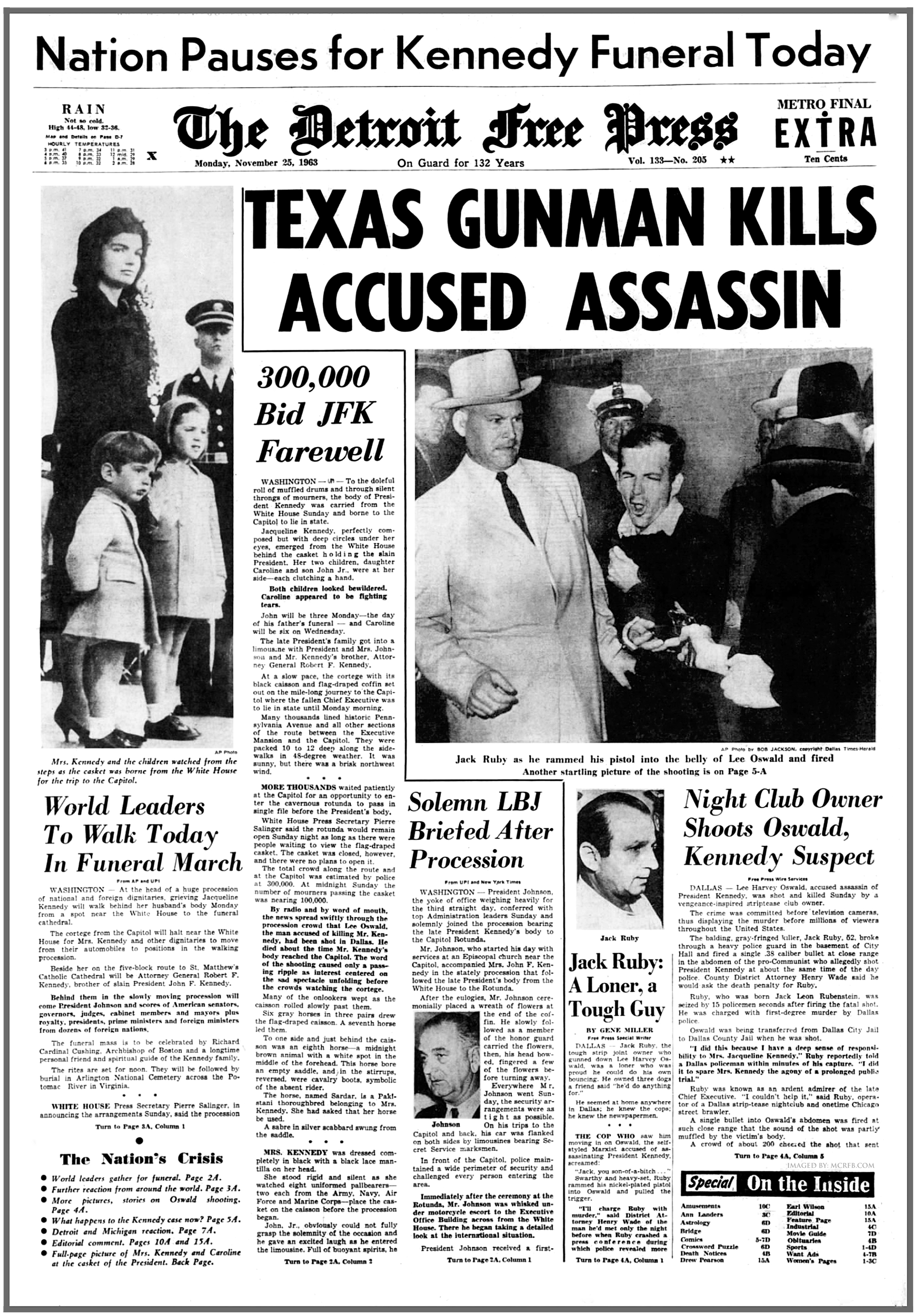
THE KENNEDY TAPES (Bob Pratt Collection) SUNDAY, NOVEMBER 24, 1963 [B]
NBC Radio Network (3:03 P.M. – 6:00 P.M.)
_______________
The NBC radio memorial tribute, ‘President John F. Kennedy: The Highest Price’ (conclusion)
Near the end of this segment you will note a brief NBC radio commentary by Morgan Beatty (11:21 p.m.); Bryson Rush (Washington)
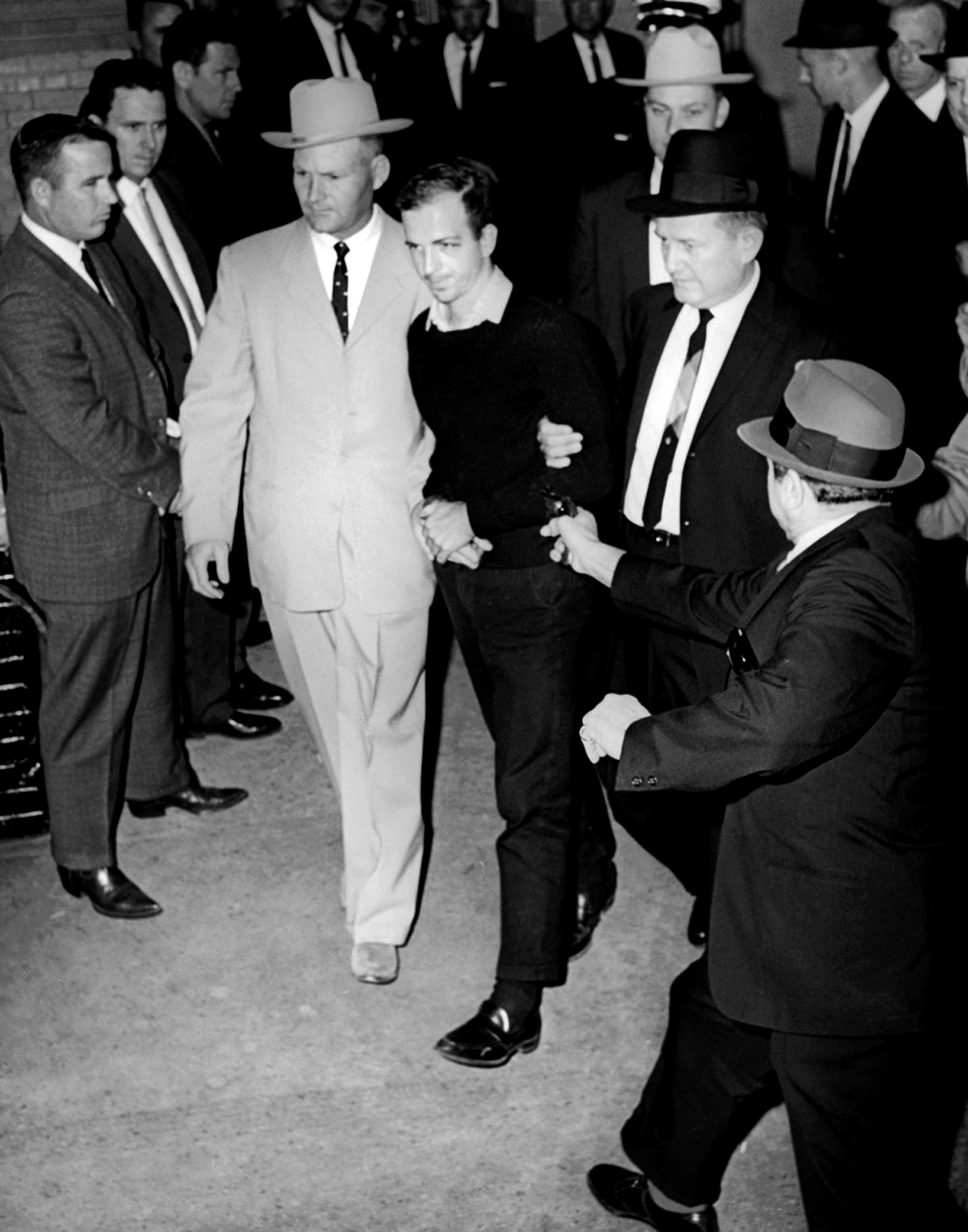
ABOUT THESE NOVEMBER 1963 RECORDINGS
_______________
A special THANK YOU to Bob Pratt, of Farmington Hills, MI., for contributing these historic recordings with Motor City Radio Flashbacks.
In November 1963, Bob Pratt recorded over 15 hours on reeled tapes covering the tragic four days, 55 years ago.
Some 8 minutes after Lee Harvey Oswald was shot on live TV (12:21; EST), Bob Pratt began to record the events as NBC radio was breaking the story over WWJ-FM, Detroit. The recordings began approximately 12:29 p.m., through 6:00 p.m., Sunday evening, November 24, 1963.
Bob Pratt shares his recollections of President Kennedy’s assassination. His personal memories is featured on this website, here.
These 1963 Detroit radio broadcasts was never available to anyone — anywhere — until now. Motor City Radio Flashbacks features these historic recordings in their entirety — exclusively here — for the very first time.
_______________
TOMORROW: WWJ FM November 25, 1963
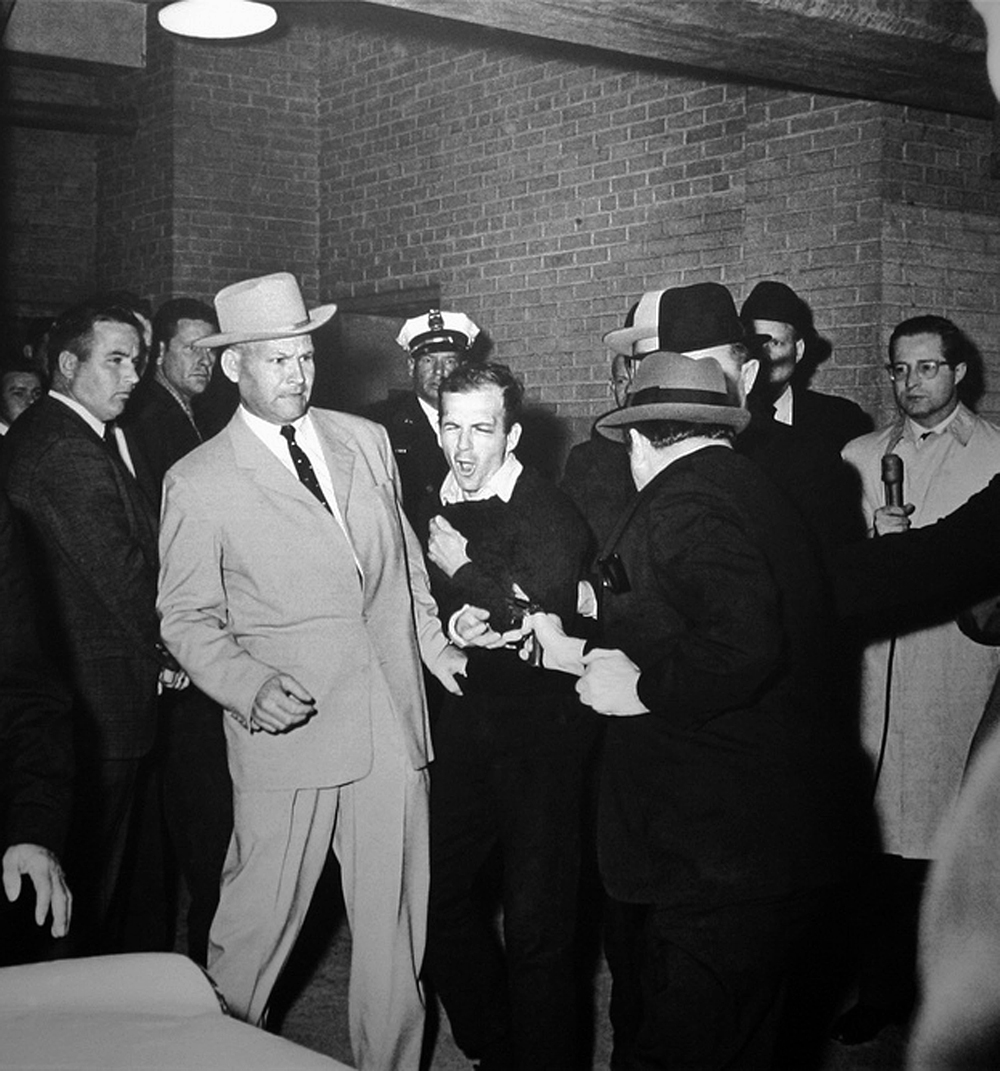
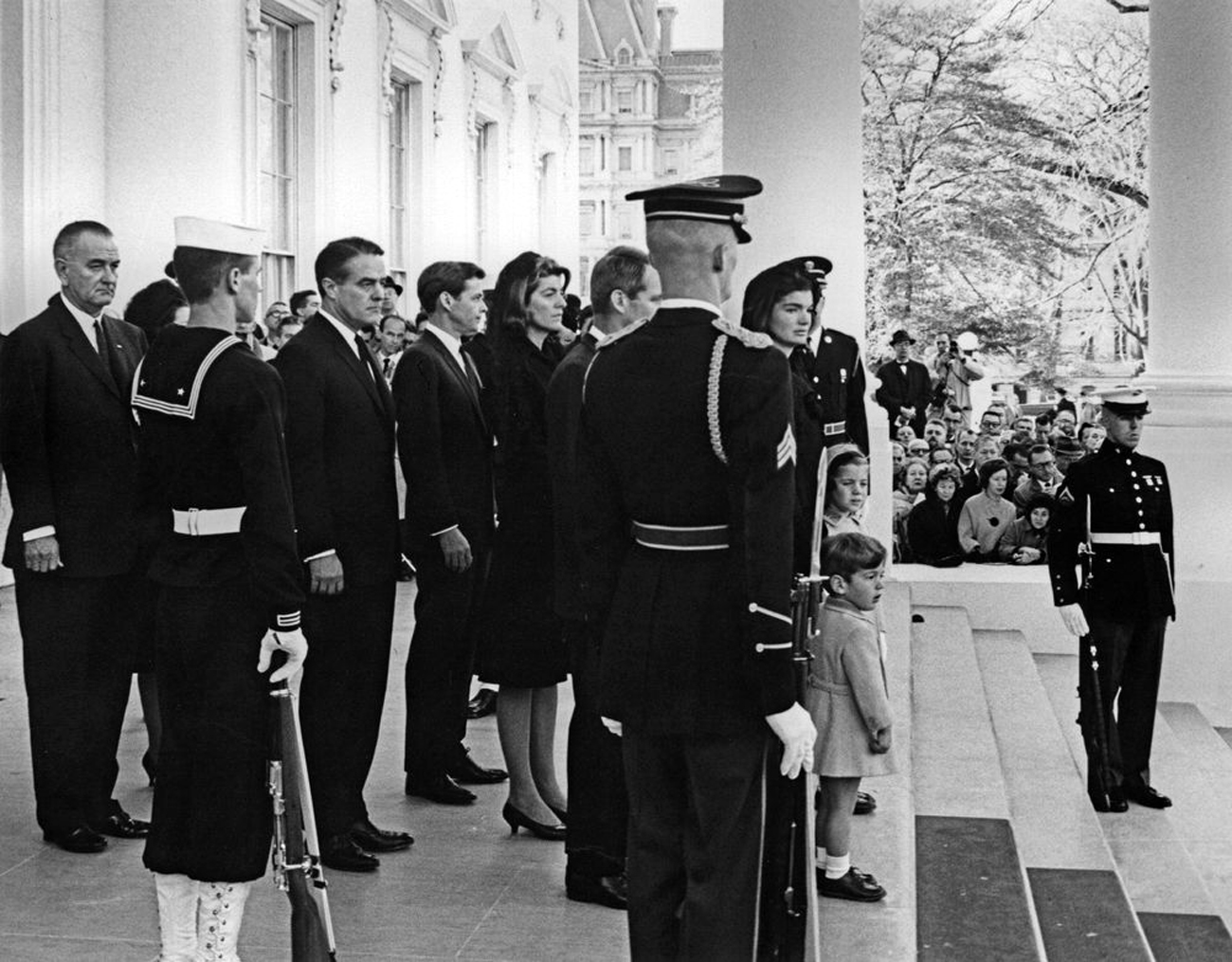
— ABOUT THESE IMAGES —
Above newspaper images courtesy from the freep.com newspaper archive. Copyright 2018. Newspapers.com.
The above featured images was ‘clipped,’ saved, and imaged from the credited source by Motor City Radio Flashbacks
For largest views — if viewing on your mobile device, tap over newspaper images. Open to second window. “Stretch” images across your device screen to magnify detailed view.
All images posted in this featured presentation was created by Jim Feliciano. The ‘televised’ image was used, having been obtained from the personal collection of the author.
Photos featured: Associated Press (Bob Jackson); Dallas Morning News (Jack Beers) Associated Press
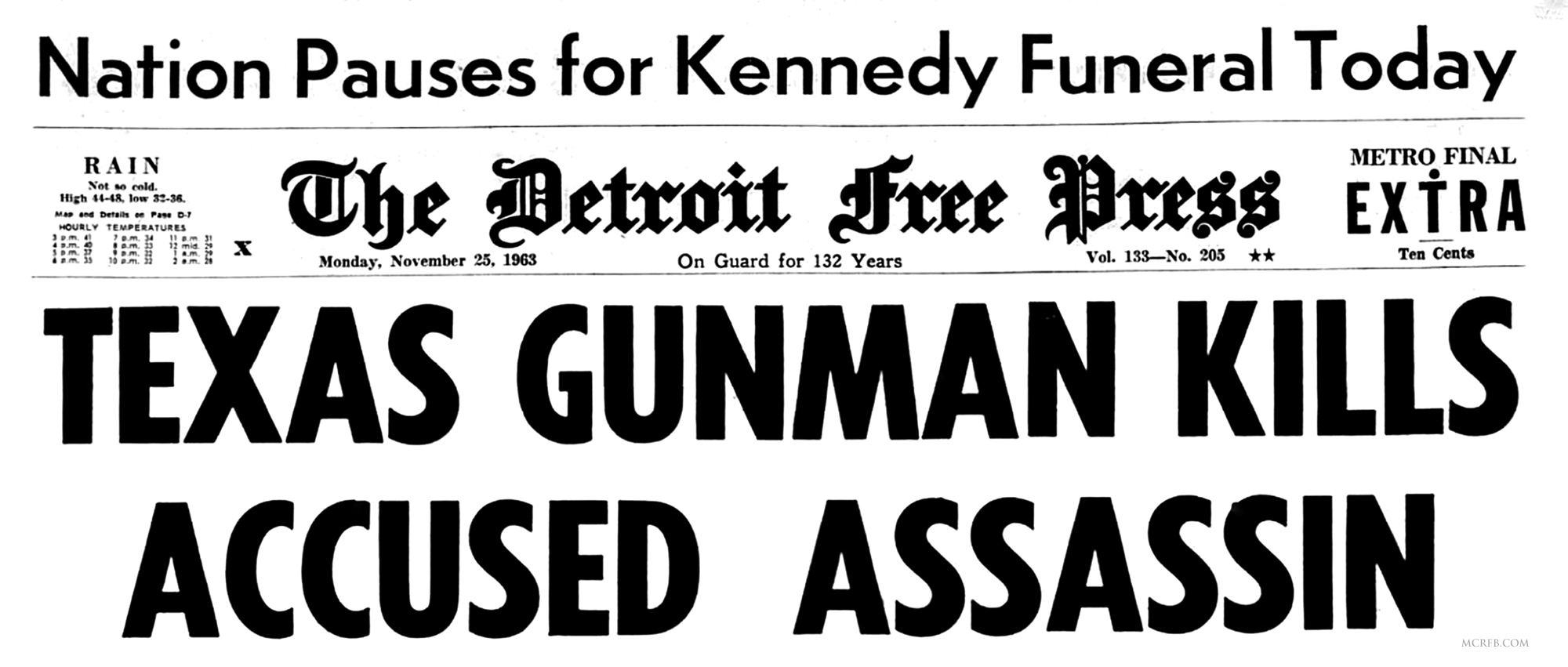
![]()
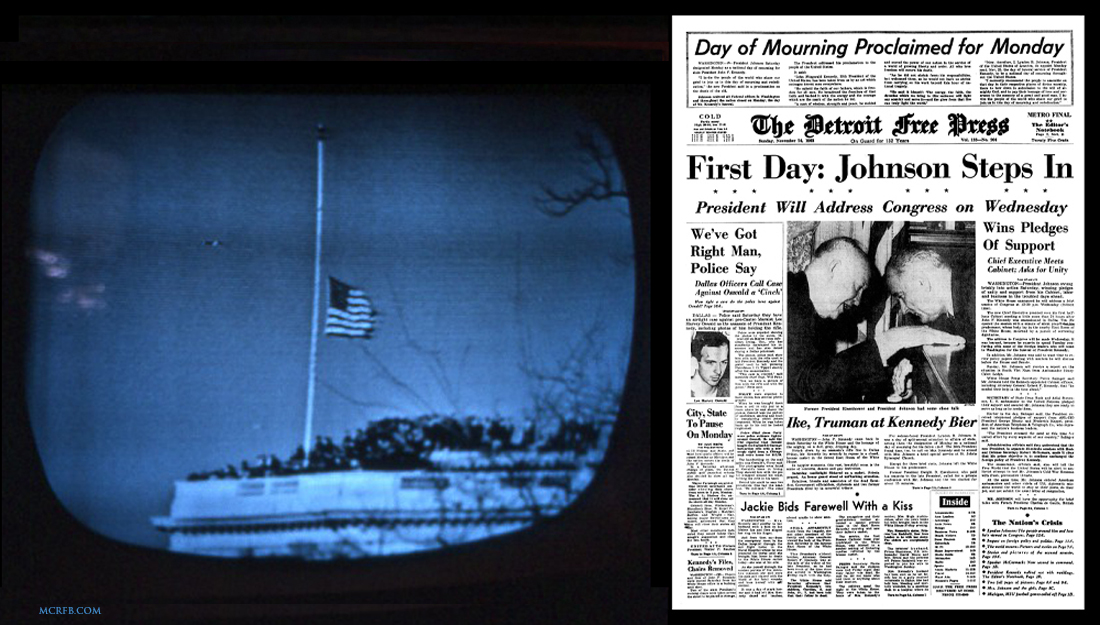
THE KENNEDY TAPES (Bob Pratt Collection) SATURDAY, NOVEMBER 23, 1963
WJBK Radio 15 News (1:00 P.M. – 1:31 P.M.)
_______________
In this segment you will hear the 1:00 p.m. WJBK Radio 15 Newsline Report with Bob King and Bernard Morris.
In November 1963, the WJBK News department comprised of 5 news anchors. The Radio 15 anchors were: Bob King, Norm Lenhardt, Alan Thayer, Bernard Morris and Bob Edgington.
For news and information, the WJBK news department was reliant on UPI and AP teletypes machines for local, domestic, and international news wires and reports.
In 1963, the Detroit Storer Broadcasting owned WJBK radio station was not affiliated with any major news organizations nor with a major news network.
You will note a somber solemnity in the first day of national mourning. WJBK, a top 40 station, dropped their music format. The station reverted instead playing dirge music — breaking only for news as they developed — at the top and bottom of the hour throughout their broadcasting day, November 23, 55 years ago.
Bob King and Bernard Morris | WJBK FM Detroit
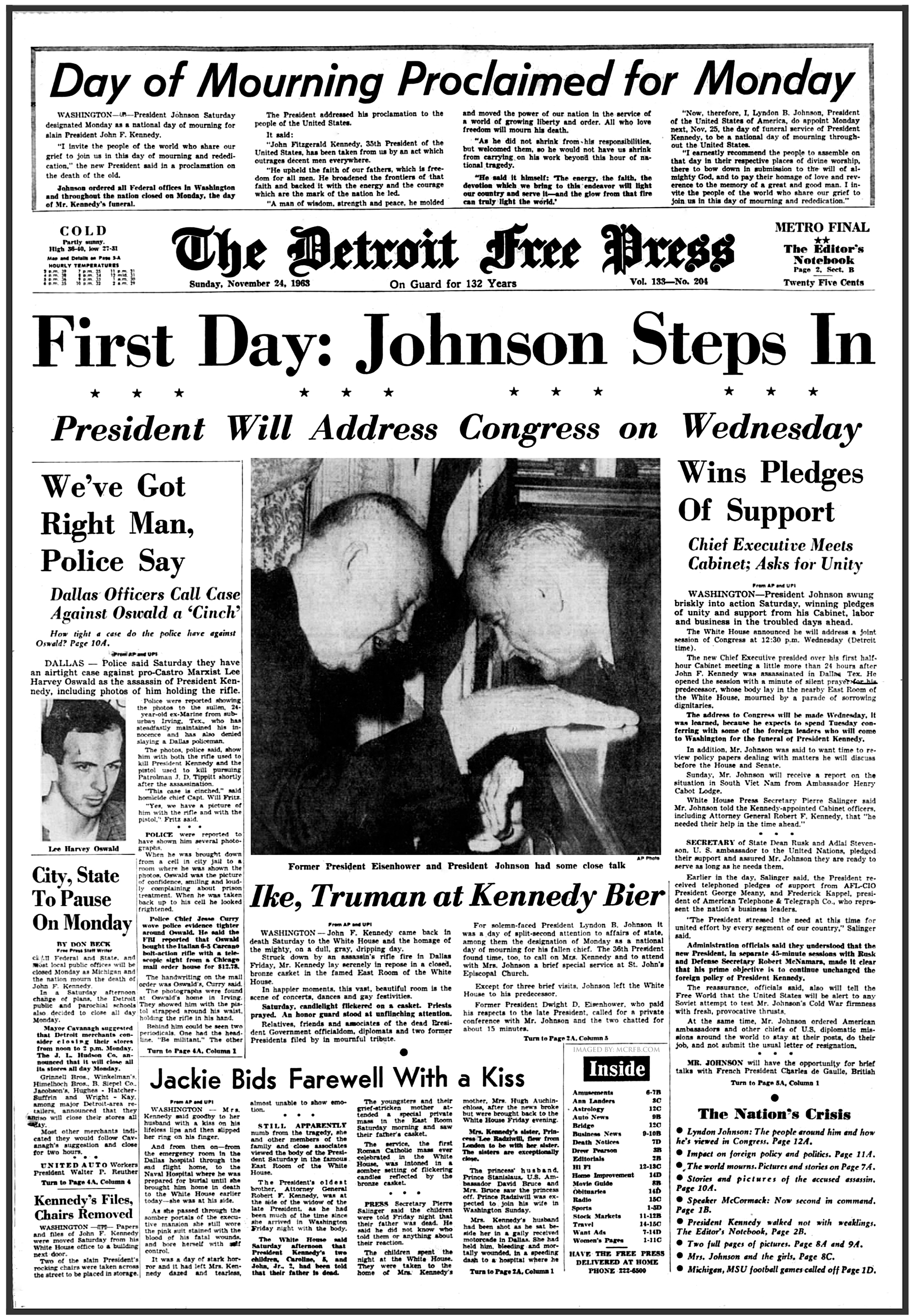
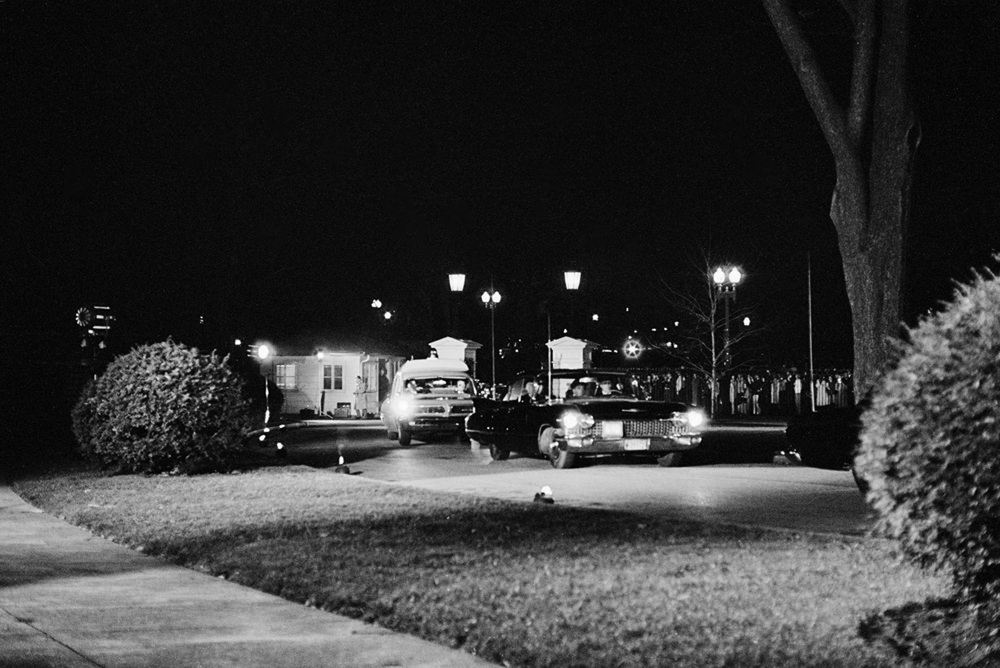
THE KENNEDY TAPES (Bob Pratt Collection) SATURDAY, NOVEMBER 23, 1963
NBC Radio Network (7:30 A.M. – 10:00 A.M.) [A]
_______________
In this (newly added; November 1, 2019) WWJ-AM segment you will hear NBC radio reports by Russ Ward (New York) and following correspondents:
Richard Volariani (Washington); John Rich (Tokyo); Pierce Allman (Dallas); Enaldo Akalena (Beirut); Wilson Hall (Rio De Janeiro); Joseph C. Harsh (London); John Sharky (Saigon); Phyllis Hepp (Nairobi); Alvin Rosenfeld (Tel Aviv); Irvin R. Levine (Rome); Peter Hackuss (Washington); John Chancellor (Berlin); John Lavencheck (Miami); Robert McCormick (Washington); Robert Gorawlski (White House); Hubert Humphrey (Washington); Bernard Prissell (France) Pope Paul IX (Vatican); Senator John Tower (New York); Representative Hale Boggs (Louisiana); Representative Gerald R. Ford (Michigan); Representative Albert Thomas (Washington); Alan Kennedy (New Delhi)
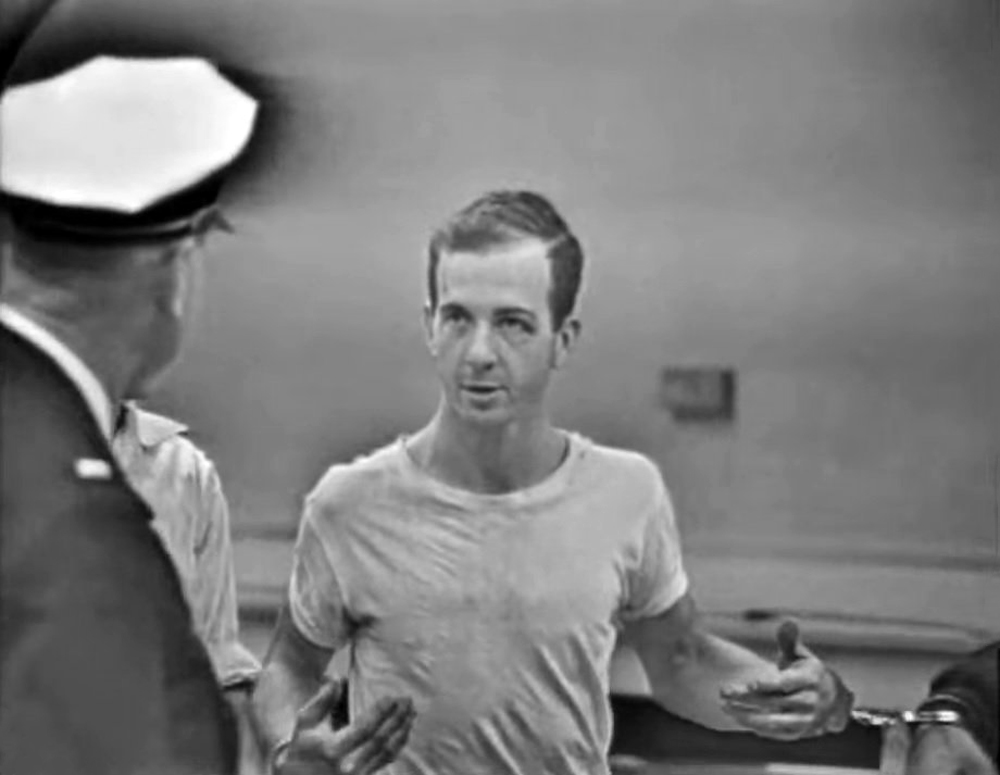
THE KENNEDY TAPES (Bob Pratt Collection) SATURDAY, NOVEMBER 23, 1963
NBC Radio Network (10:00 A.M. – 12:00 P.M.) [B]
_______________
In this (newly added; November 1, 2019) WWJ-AM segment you will hear NBC radio reports by Russ Ward (New York) and following correspondents:
Irvine R. Levine (Rome); Ed Newman (Washington); Robert Goralski (White House); Ron Nessen (Washington); Tom Petitt (Dallas); Jim Jenson (Hyannis Port); Jim Holbrook (Chicago); Ray Sherer (White House); Jim Hurlman (New York); Ray Moore (Atlanta); Robert Abernathy (Washington); Bryson Rash (Washington): Eli Abel (State Department); Richard Harkness (Andrews Air Force Base); Dr. William H. McCarcall (Bristol, Tennessee); Wells Heilmann (Bonn)
ABOUT THESE NOVEMBER 1963 RECORDINGS
_______________
A special THANK YOU to Bob Pratt, of Farmington Hills, MI., for contributing these historic recordings with Motor City Radio Flashbacks.
In November 1963, Bob Pratt recorded over 15 hours on reeled tapes covering the tragic four days, 55 years ago.
_______________
The WWJ-AM recordings began at 7:30 a.m., when NBC Radio (New York) signed on all their affiliates nationwide, Saturday morning, November 23, recorded until 12 noon. The WJBK-FM recording began at the top of the 1:00 p.m. hour until just after 1:30 p.m.
Bob Pratt shares his own recollections of President Kennedy’s assassination. His personal memories is featured on this website, here.
These historic Detroit radio broadcasts was never available to anyone — anywhere — until now. Motor City Radio Flashbacks features these historic recordings in their entirety — exclusively here — for the very first time.
_______________
TOMORROW: WWJ FM November 24, 1963
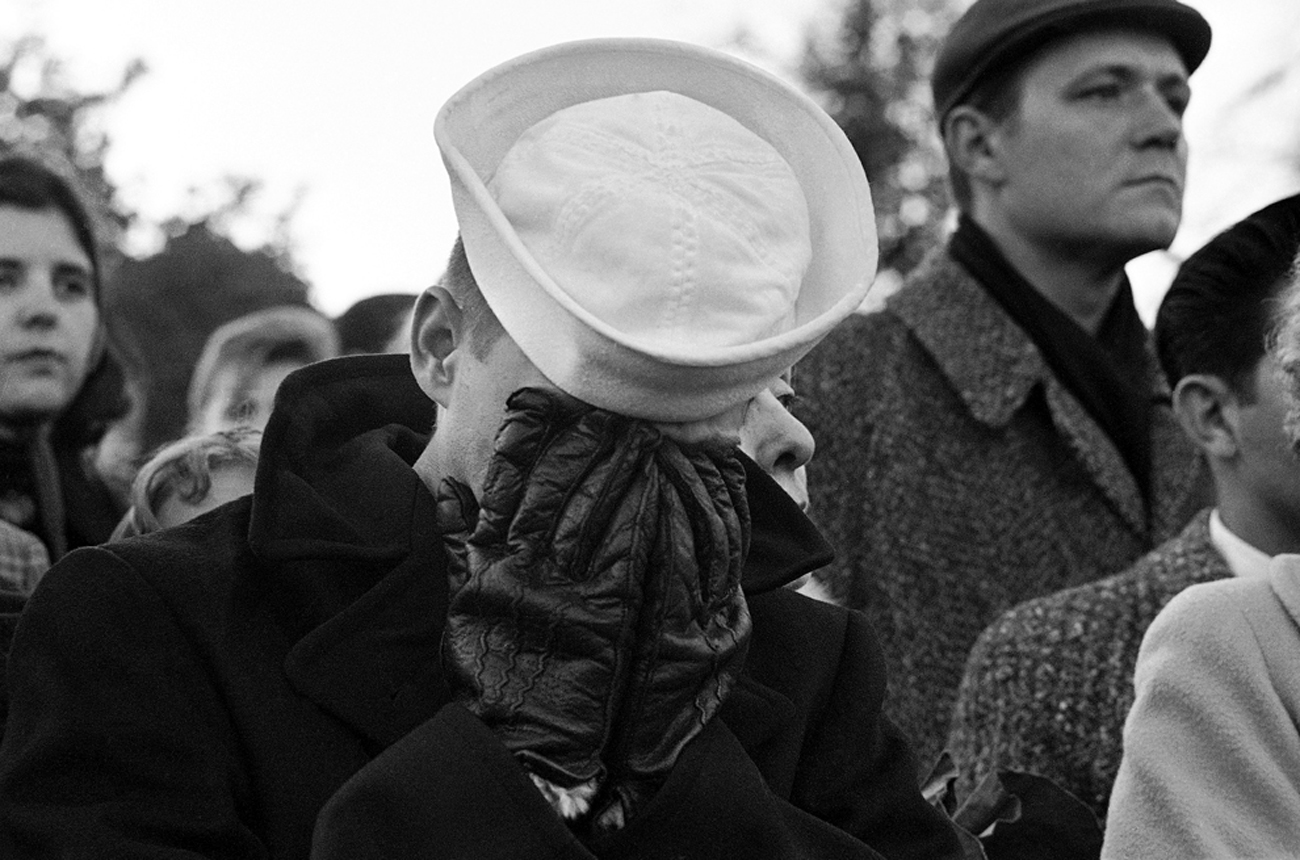
— ABOUT THESE IMAGES —
Above newspaper images courtesy from the freep.com newspaper archive. Copyright 2018. Newspapers.com.
The above featured images was ‘clipped,’ saved, and imaged from the credited source by Motor City Radio Flashbacks
— NOTES —
For largest views – if viewing on your mobile device, tap over newspaper images. Open to second window. “Stretch” images across your device screen to magnify detailed view.
All images posted in this featured presentation was created by Jim Feliciano. The ‘televised’ image was used, having been obtained from the personal collection of the author.
Photos featured: Associated Press
Photo caption: Four days in November. The mood of a nation. A U.S. serviceman weeps as President Kennedy’s caisson rolls by inside Arlington.
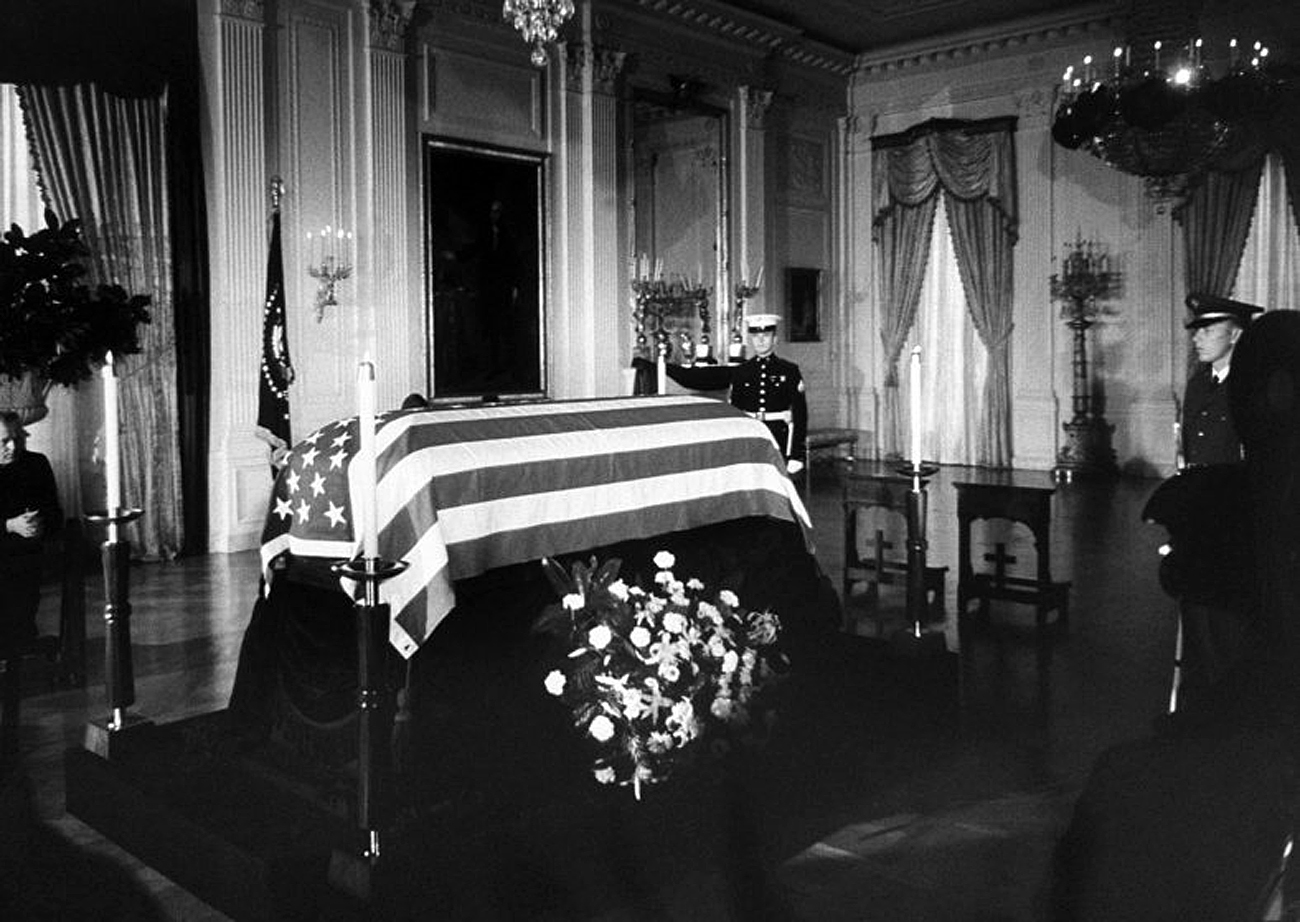

![]()
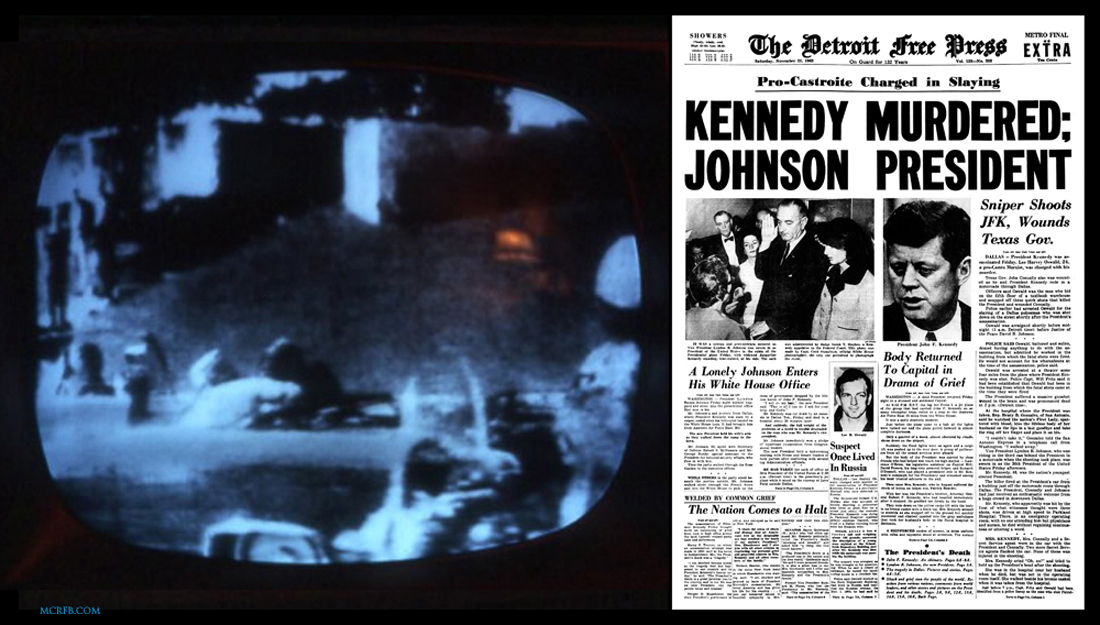
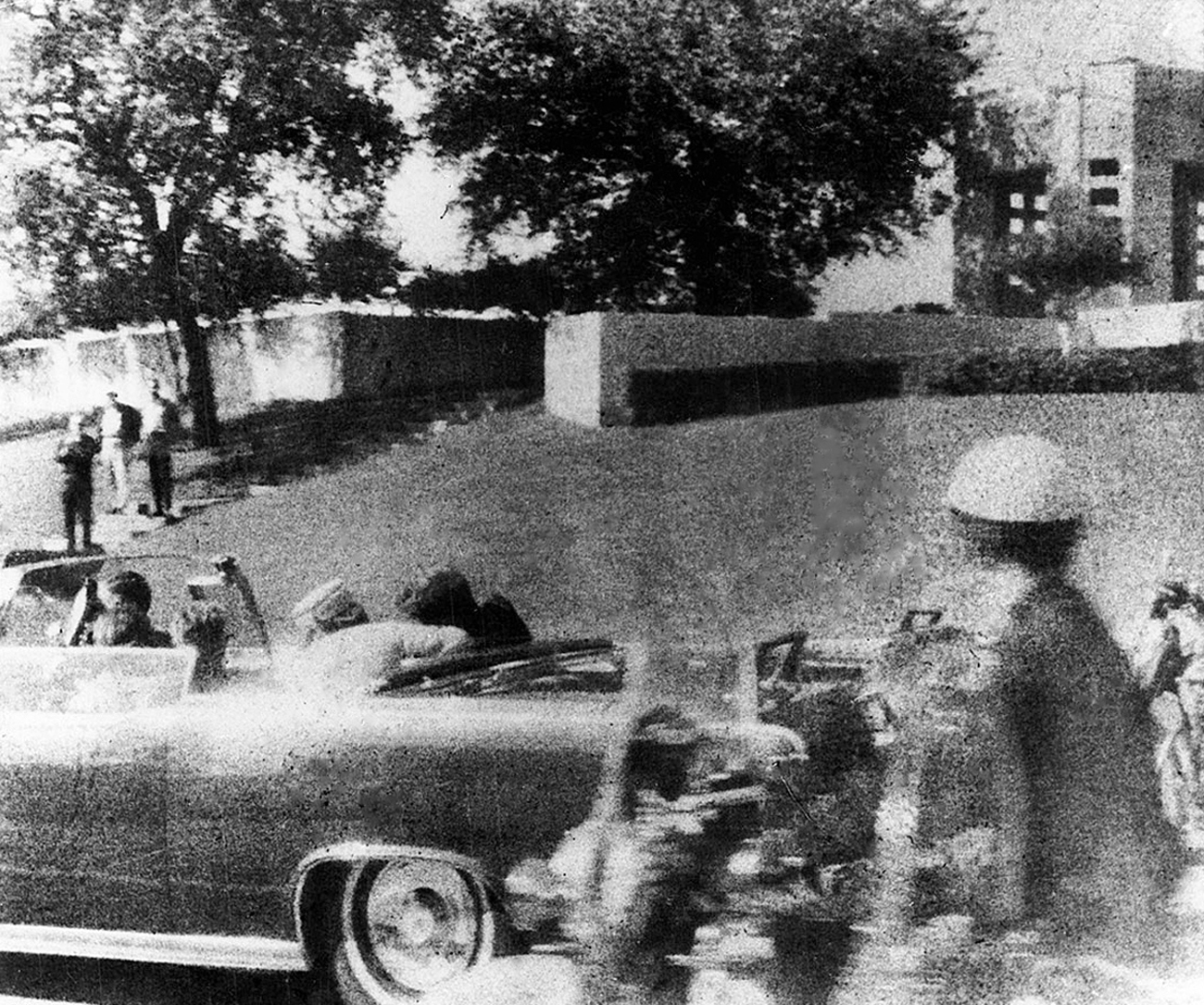
THE KENNEDY TAPES (Bob Pratt Collection) FRIDAY, NOVEMBER 22, 1963
NBC Radio Network (2:00 P.M. EST – 3:45 P.M. EST) [A]
_______________
Approximately 20 minutes after NBC broke programming with a bulletin (AP; 12:40 p.m., CST) President Kennedy had been shot, the NBC Radio Network in New York took control of the news coming out of Dallas on all the NBC affiliates nationwide, including WWJ, WWJ FM in Detroit, at the top of the hour — 2:00 P.M., EST, Friday, November 22, 1963.
_______________
Peter Hackuss (NBC Radio Network, New York); Edwin Newman (NBC Radio Network, New York)
Robert MacNeill (Dallas); Bill Ryan (NBC TV [feed] New York); Charles Murphy (ABC-TV [feed] Dallas); David Brinkley (NBC TV [feed] Washington); Alan Bickley (WFAA Dallas); Joseph Michaels (New York); Jean Hill [eyewitness] WFAA Dallas); Frank McGee (NBC TV [feed] New York); Robert Gorawlski (Washington); Chet Huntley (NBC TV [feed] New York); John Holfin (NBC cameraman [eyewitness] Dallas); Morgan Beatty (NBC Radio Network, New York); John Lavencheck (Miami); Robert McCormick (Washington); Pierce Allman (WFAA Dallas); Irving R. Levine (Rome); Kenneth Bernstein (London)
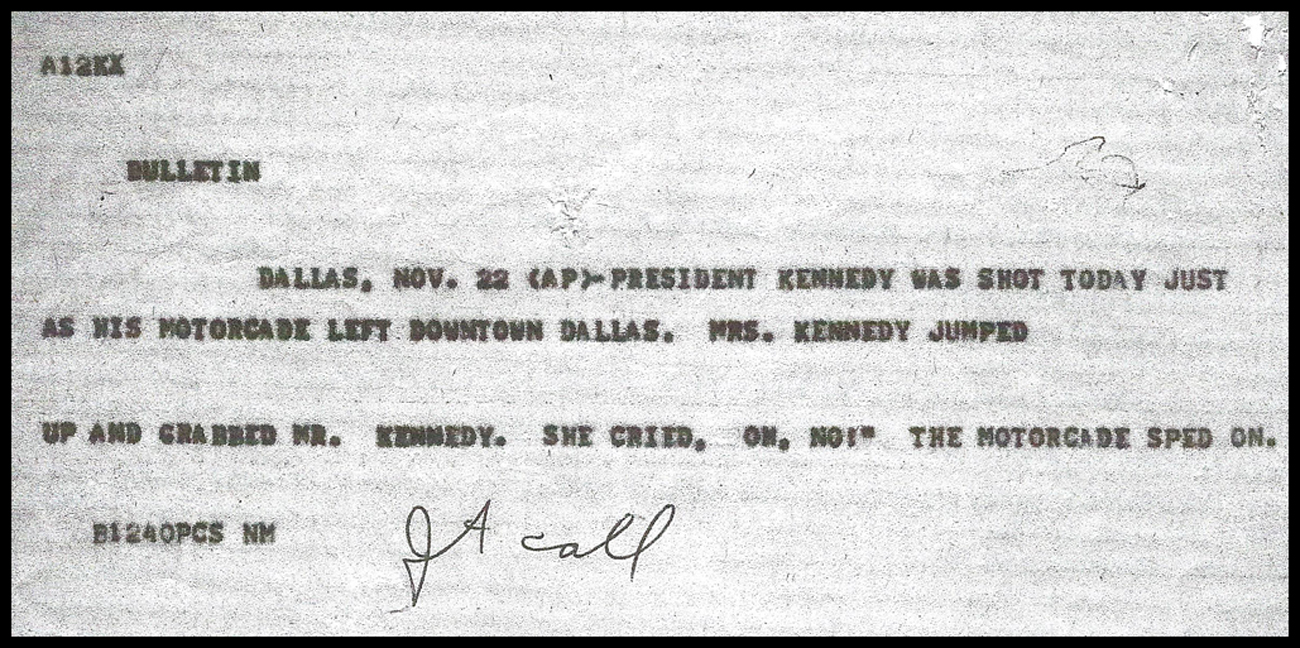
THE KENNEDY TAPES (Bob Pratt Collection) FRIDAY, NOVEMBER 22, 1963
NBC Radio Network (6:20 P.M. – 8:55 P.M.) [B]
_______________
In this segment you will hear NBC radio reports by the following correspondents:
Joseph Michaels (New York); Bernard Brussell (Paris); Ray Sherer (Washington); Joseph Hersh (London); Berry Simmons (San Diego); Pierce Allman (Dallas); Ian Stewart (Hong Kong); Peter Hackett (Washington); Robert Abernathy (Washington); Nancy Dickerson (Washington); Tom Petitt (Dallas) David Abernathy (Bonn); Richard Volariani (Washington); Robert Goralski (Washington); Joseph Michaels (JFK in New York; 11-15-1963)
Also — you will hear a special WWJ radio news report by:
John Hultman | WWJ WWJ FM (NBC; Detroit)

THE KENNEDY TAPES (Bob Pratt Collection) FRIDAY, NOVEMBER 22, 1963
NBC Radio Network (8:56 P.M. – 11:36 P.M.) [C]
_______________
In this segment you will hear NBC radio reports by the following correspondents:
Bob Whitten (Sacramento); Robert Goralski (Washington); Tom Perryman (Dallas); John Rich (Tokyo); Herbert Kaplow (Washington); Joseph Michaels (Interviews Carlos Bringuier, New Orleans — New York); Richard Valariani (Washington); John Chancellor (Berlin); Tom Petitt (Dallas); Robert Abernathy (Washington)
Also — you will hear a special WWJ radio news report by:
Don Perrie | WWJ WWJ FM (NBC; Detroit)
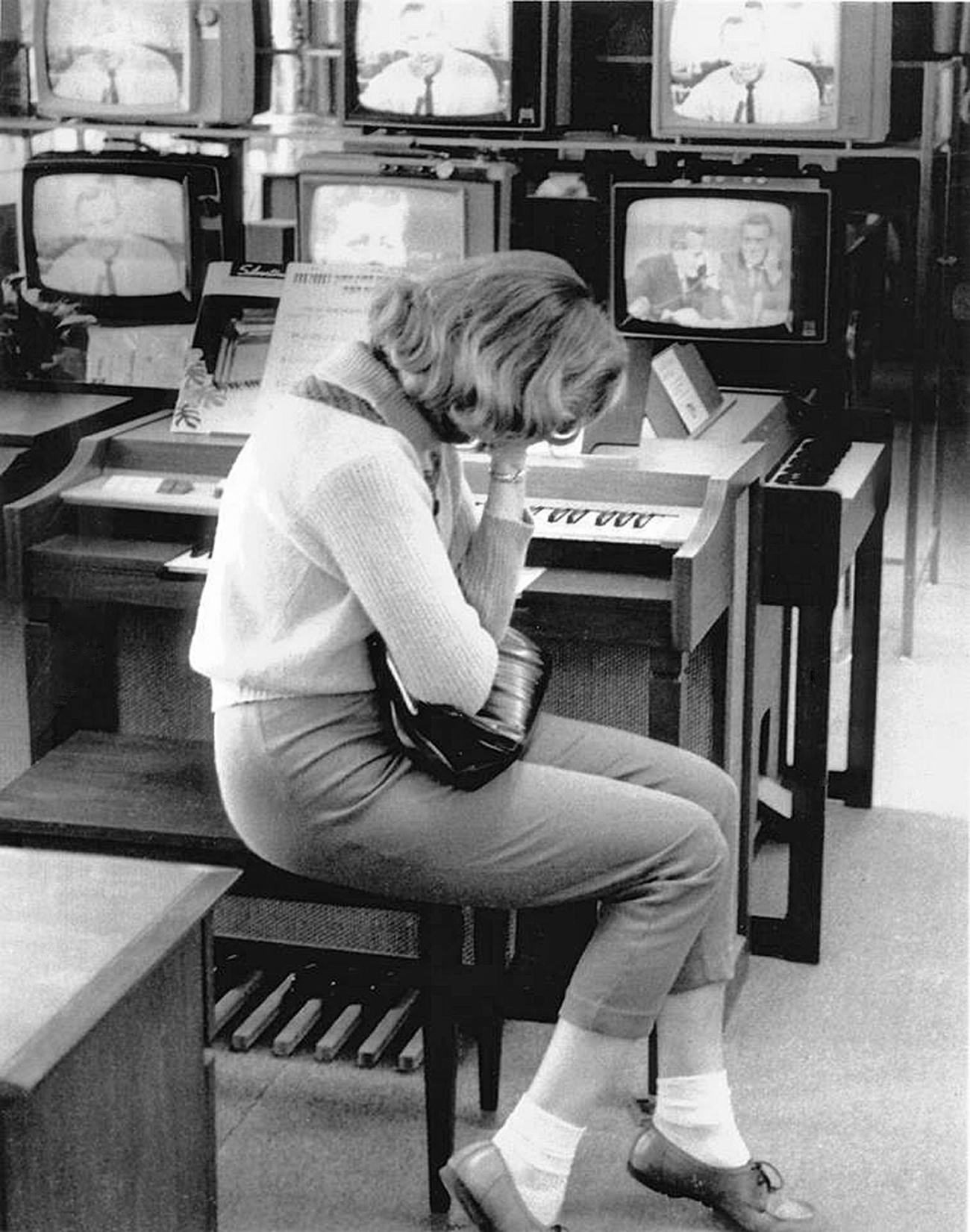
ABOUT THESE NOVEMBER 1963 RECORDINGS
_______________
A special THANK YOU to Bob Pratt, of Farmington Hills, MI., for contributing these historic recordings with Motor City Radio Flashbacks.
In November 1963, Bob Pratt recorded over 15 hours on reeled tapes covering the tragic four days, 55 years ago.
Some 5 hours after the NBC Radio Network broke with stunning word President Kennedy had been shot (12:40 p.m., CST; 1:00 p.m., CST;) Bob Pratt proceeded recording more of the NBC radio news — as they unfolded on WWJ-FM, Detroit. The evening recordings began at 6:20 p.m., running through 11:36 p.m. Friday night, November 22, 1963.
Bob Pratt shares his recollections of President Kennedy’s assassination. His personal memories is featured on this website, here.
These historic Detroit radio broadcasts was never available to anyone — anywhere — until now. Motor City Radio Flashbacks features these historic recordings in their entirety — exclusively here — for the very first time.
_______________
TOMORROW: WJBK FM and WWJ AM November 23, 1963
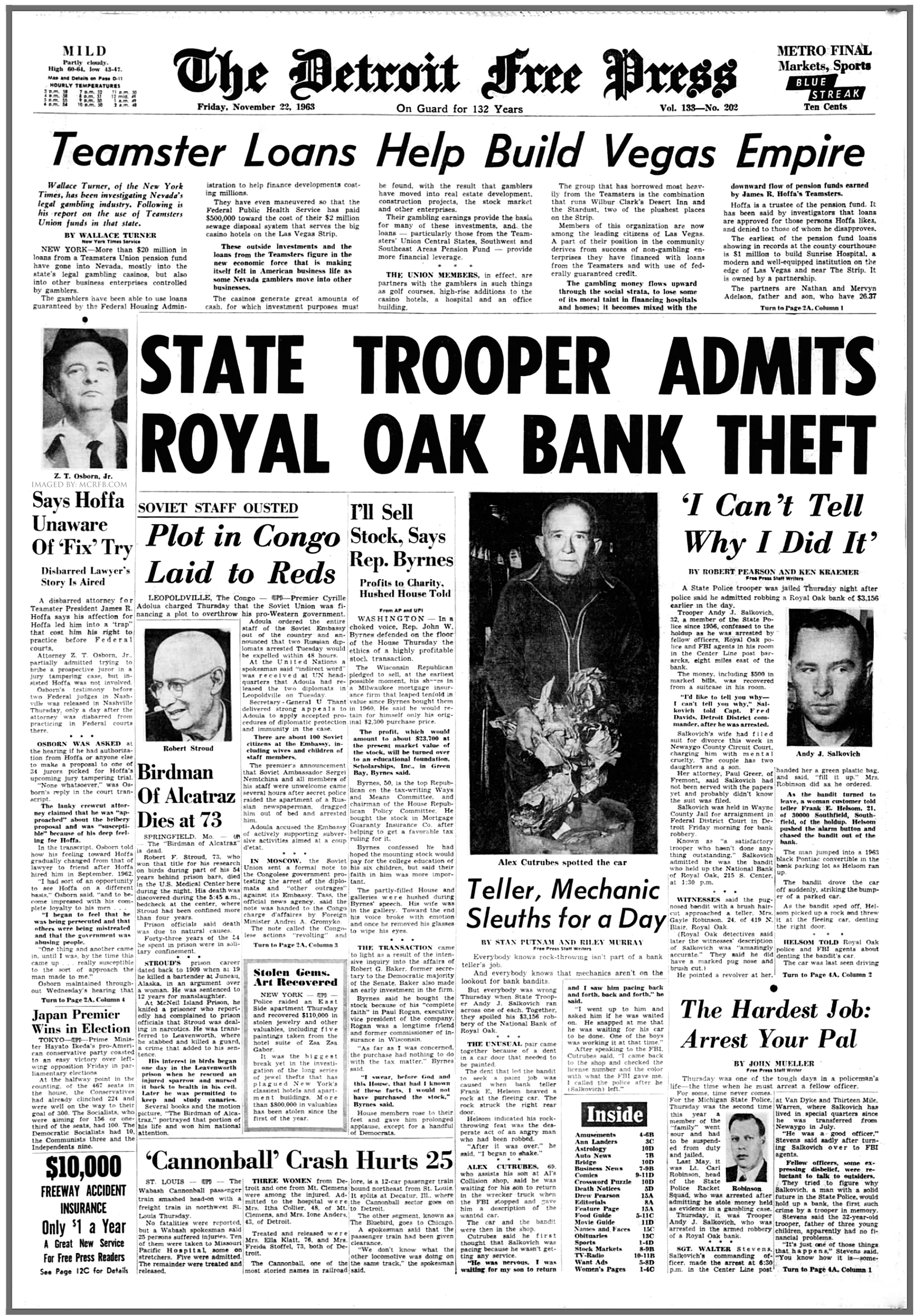
— ABOUT THESE IMAGES —
Above newspaper images courtesy from the freep.com newspaper archive. Copyright 2018. Newspapers.com.
The above featured images was ‘clipped,’ saved, and imaged from the credited source by Motor City Radio Flashbacks

— NOTES —
For largest views — if viewing on your mobile device, tap over newspaper images. Open to second window. “Stretch” images across your device screen to magnify detailed view.
All images posted in this featured presentation was created by Jim Feliciano. The ‘televised’ image was used, having been obtained from the personal collection of the author.
AP Bulletin image: Scanned from an actual 11-22-1963 AP scroll. (from the author’s personal collection)
_______________
Photo featured: Associated Press (Mary Moorman)
_______________
Photo featured: Jack Rosen
About this photo: Photographer Jack Rosen captured this image, on November 22, 1963, inside a Sears & Roebuck department store, in Levittown, PA.
(Note the television monitors. Broadcasting the news coming out of Dallas that day. CBS, ABC, NBC, respectively).
The author purchased this very image, 10 years ago, from the Jack Rosen website. This same image is available and can be purchased HERE
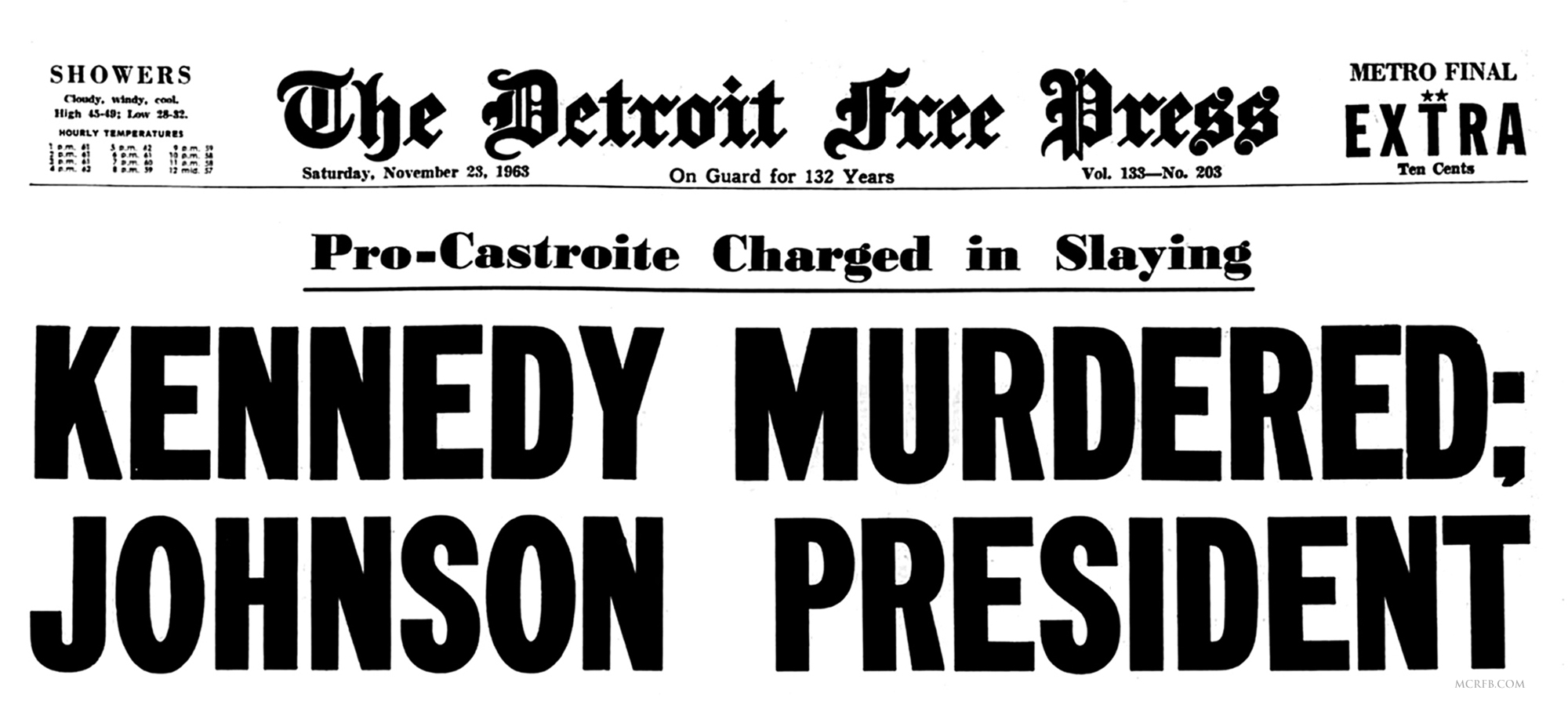
![]()

Recorded by Bob Pratt. November 1963
_______________
November 22, 1963 started out like any other Friday in Detroit. I was a junior studying electrical engineering at Wayne State University and I awaited the arrival of my friend, Dany, that morning. It was his day to drive and we were soon on our way.
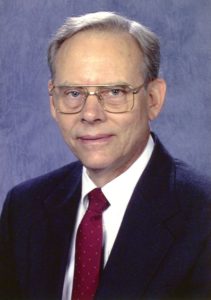
Our classes were mostly in the morning and we were ready to leave for our return trip home by early afternoon. But before we could leave, Dany had to make a stop at the engineering office to pick up some important papers from one of the professors. He parked in front of the engineering office and headed in. I waited in the car.
In those days, I was one of the on-air personalities with a DJ show once a week and occasionally a news broadcast on the campus “current carrier” AM station, WUBG. There had been talk among the station management about beginning some dramatic radio plays at some point, and although I wasn’t involved in that endeavor, I was curious about what was on the air while I waited. I tuned in to 620 AM and discovered a play in progress about the assassination of the president. Ah, the Abraham Lincoln story, I figured. It was being presented in a very dramatic and realistic style and I was hooked for a while.
But I began to sense that something was not quite right about the details and I decided to tune in something else. I switched over to WJR to catch some music and quickly realized that this was not about our 16th president, but was a live news report about our 35th president, John F. Kennedy. I was stunned to learn he had been critically shot and might not survive. It was the biggest shock I had ever received in my young life.
Dany returned a few minutes later and we headed toward my home in silence, except for the somber reports from the radio. I turned on the TV when I arrived home and my mother and I remained glued to the set until my dad arrived home from work.
I had a quarter track stereo tape deck back then, a Viking model 88 that allowed two stereo tracks or up to four mono tracks to be recorded on the two sides of a tape. My dad suggested that I get upstairs and start recording from the radio as quickly as possible. I grabbed an empty tape, loaded it up and tuned into WWJ-FM. They were broadcasting a network news feed from NBC radio at that time.
We had a quick dinner and my dad had another stroke of genius. “Keep recording as long as you can and I’ll go out and buy several 2400 Ft reels of tape. We should be able to go for several days.” he said. And so we did.
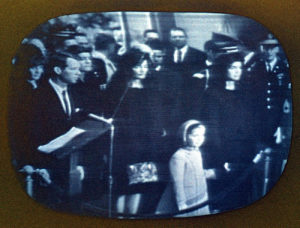
Over the next few days we recorded as much as we could, day and night, from WWJ-FM, WJR-FM and WJBK-FM. There were reports from around the world, across the nation and around our town of the capture of the assassin, the death of the president, the funeral, and comments from world leaders, local dignitaries and neighbors down the street.
We followed the capture of Lee Harvey Oswald by the police and his assassination by Jack Ruby. We cried at the TV scenes of the first lady and the president’s children who stood stunned by the events and his loss. Although the pomp and circumstance were over in a few days, the memories of those times will never leave me.
After the events were finally over, I packed the tapes away for safe keeping. There were about 16 hours of sound all together. I never listened to them until a few months ago when my friend, Jim Feliciano, mentioned that he was very interested in the Kennedy assassination and wondered if I had any recordings from 1963.
I pulled out the box and examined the tapes. They looked to be in good shape. I spot checked a couple and found that indeed the recordings were well preserved. I offered to make copies for him.
I planned to let each track run for the full hour into my computer and convert each to an mp3 file for storage. But they were so captivating that I listened to almost every one during the recording process. It was a truly somber experience, and with all the international comments, it made me realize how loved and respected the United States and our people were in those days.
The tapes also showed how we as a nation stuck together almost as one big family. I long for those simpler days and wonder if we will ever be able to restore the cohesiveness and compassion we had back then.
As President John Kennedy famously said a long time ago, his Boston-accented voice still resonates with me today — I can hear it now — “Ask not what your country can do for you, ask what you can do for your country.”
— Robert G. Pratt
9/30/2018
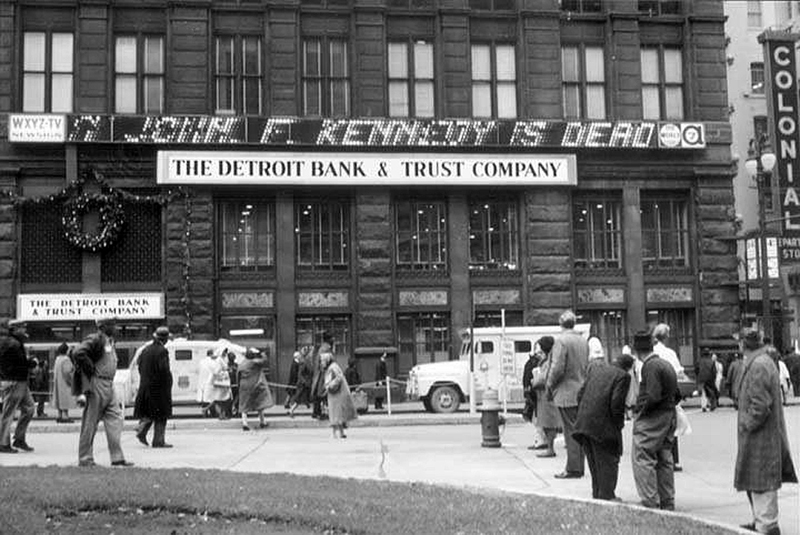
_______________
A special ‘THANK YOU’ to Bob Pratt, Farmington Hills, Michigan, for sharing his personal thoughts, memories from November 1963 with us today.
Beginning today, and for the next three days, Motor City Radio Flashbacks will feature Bob Pratt’s historic recordings, covering those four tragic days, November 1963.
— A TIME REMEMBERED —
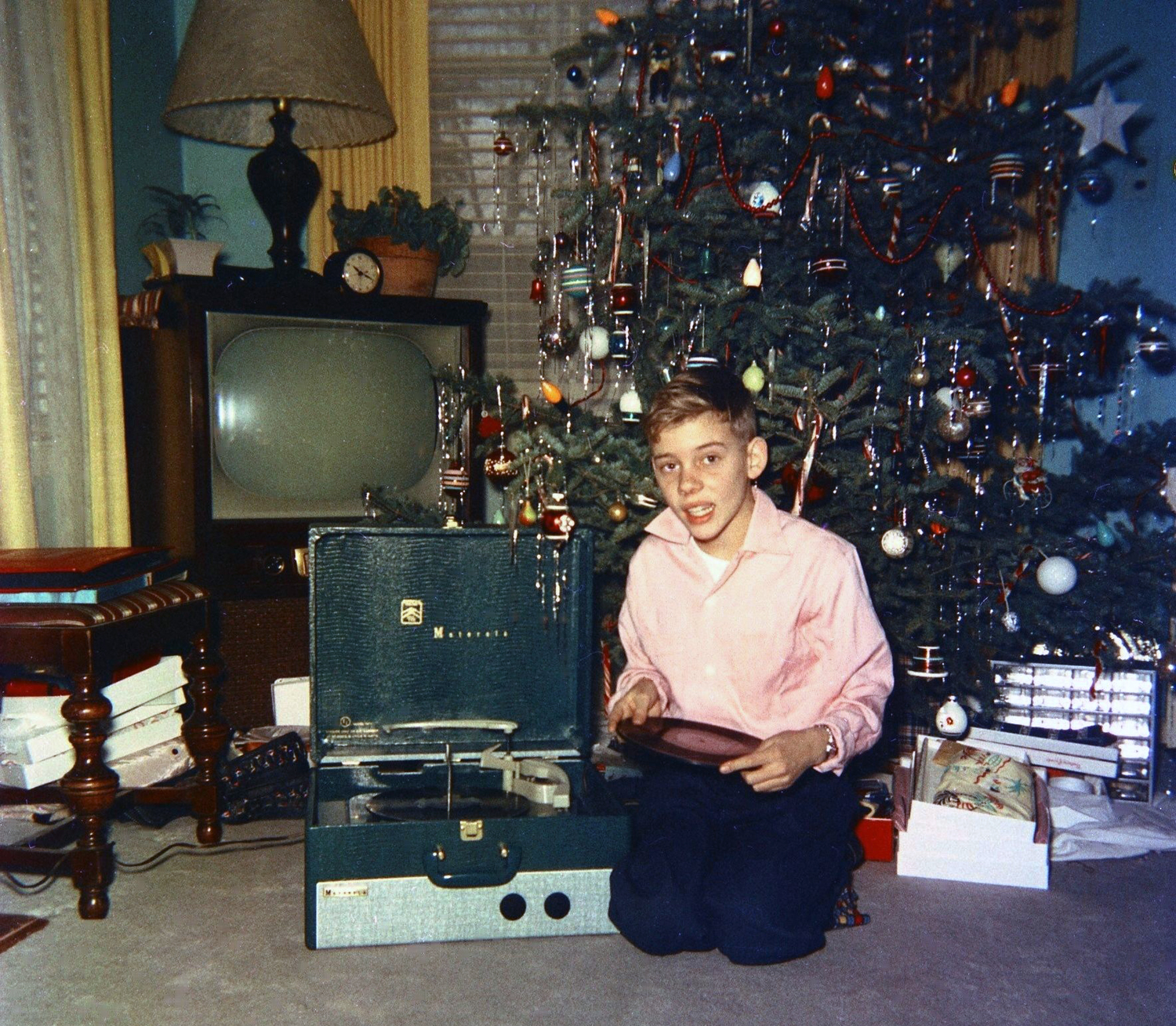
![]()
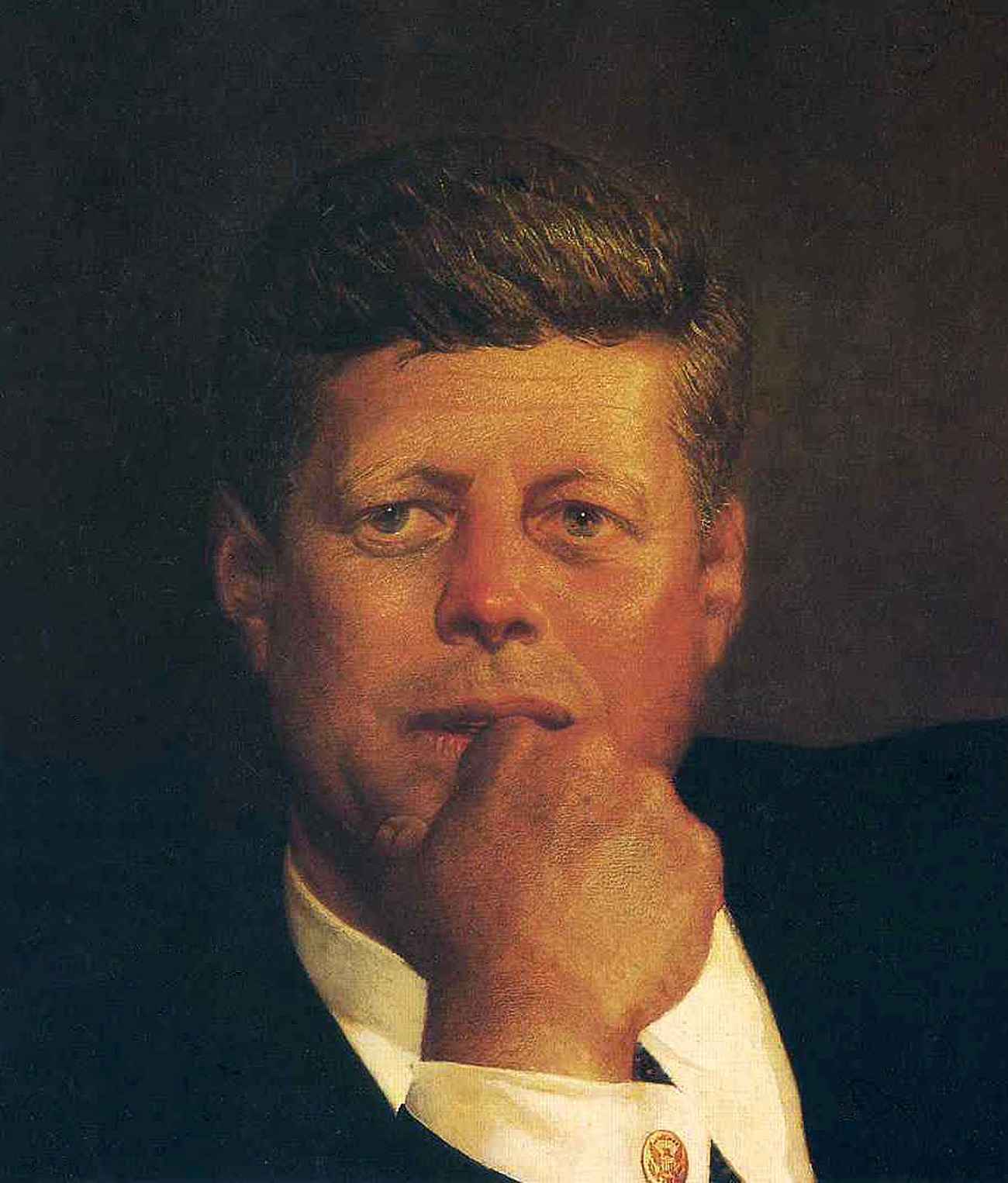

ABOUT THIS RECORDED WXYZ PROGRAM
20 years after — Michael Jackson remembers JFK — 35 years ago
This program was initially recorded on reel tape, by the author, thirty-five years ago. November 22, 1983.
This program was made possible through Bob Pratt
A special THANK YOU to Bob Pratt of Farmington Hills, MI., for recently transferring and preserving this WJR audio program. October 2018
![]()


ABOUT THIS RECORDED WJR PROGRAM
Twenty years after — Warren Pierce remembers JFK — Thirty five years ago
WJR program guests: Richard Stolley (LIFE); Officer M.N. McDonald (Dallas; Lee Harvey Oswald capture); Detective Jim Leavelle (Dallas; Oswald shooting); David Halberstam (author; ‘The Best And The Brightest’)
This program was initially recorded on reel tape, by the author, thirty-five years ago. November 22, 1983.
This program was made possible through Bob Pratt
A special THANK YOU to Bob Pratt of Farmington Hills, MI., for recently transferring and preserving this WJR audio program. October 2018
![]()